#will continue to reject my american roots in all future posts
Explore tagged Tumblr posts
Text
luigi mangione, 12/04/24
diversity win! im bisexual and im going to kill you!
#was watching a video of someone discussing him and this post popped into my head#i was like i need to find the diversity win bisexual killing post#i need to make this joke or i’ll simply expire#also i’m so sorry but every time i say his name in my head it’s in a very offensive stereotypical italian accent#i can do it i’m part italian#and if you aren’t italian you can also do it#you can and you should#it’s free real estate#fave#btw i agonised over whether to do the date the american way or the everywhere else way#but i went with american bc american politics#sorry americans won today :/#will continue to reject my american roots in all future posts
76K notes
·
View notes
Text
‘500 Essential Emo Albums’ Book Coming in January
Following up on the 500 Essential Pop Punk Albums coffee table book, Ruffian Books is back with their latest scene-inspired publication, 500 Essential Emo Albums, due January 28th, 2025. New York, NY (November 13, 2024) – Following the success of 500 Essential Pop-Punk Albums, Ruffian Books is back with their latest scene-inspired publication, 500 Essential Emo Albums, due January 28, 2025. Proving it was never just a phase, the upcoming release traces the evolution of a genre that quietly began in the late 1980s, birthed from the Washington D.C. Revolution Summer post-hardcore scene. Ironically, most of the post-hardcore groups of that era—bands like Rites Of Spring, Beefeater, the Amy Pickering-led Fire Party (“the world’s first female-fronted emo band” according to Simple Machines Jenny Toomey), Embrace, Dag Nasty, among other Dischord Records bands—were unaware they were shaping the future of emotional hardcore—later shortened to emo. Known for injecting raw emotion and confessional-style angst into their hardcore-laced sound, these bands rejected their connection to emo—even as they laid its foundation. Led by Sunny Day Real Estate, Moss Icon, Jawbreaker, Cap’n Jazz, Drive Like Jehu—and later Jimmy Eat World, Thursday, Christie Front Drive, Saves The Day, The Gloria Record, American Football, and Rainer Maria—in the ‘90s, emo continued to transform from its post-hardcore and punk roots into a genre that fostered a community deep-rooted and reliant on the connection between bands and fans. These artists were at the forefront of the emo movement that emphasized vulnerability and emotional intensity—laying bare the traits and internalized struggles of a generation of listeners who found a sense of belonging and understanding within the genre’s raw demonstrations. On 500 Essential Emo Albums, author Paige Owens adds “From the roots of the Washington D.C. hardcore scene—with pioneers like Rites of Spring, Dag Nasty, and the first all-female emo act Fire Party—to the confessional intensity of Jimmy Eat World and American Football and the heart-wrenching grit of The Black Parade by My Chemical Romance and In Love and Death by The Used, 500 Essential Emo Albums compiles all of the genre’s mainstream and deep cut moments into one book. This expansive collection showcases the albums that forged emo’s legacy and will be a must-have for lifelong elder emos and novice emo fans alike.” By the early 2000s, emo surged into the mainstream, propelled by artists such as the soul-baring Chris Carrabba-led Dashboard Confessional and My Chemical Romance, whose punk-tinged theatrics struck a chord with the sentiment of “I’m Not Okay.” Fall Out Boy brought a pop-punk/emo hybrid that broke out of the Chicago suburbs while Taking Back Sunday fused their post-hardcore energy with an emotional delivery. Paramore, fronted by Hayley Williams, infused vulnerability into their youthful angst, capturing the hearts of a new generation that needed a female leader. These artists became icons of the emo movement, their faces plastered on the covers of teen magazines and taped into collages on bedroom walls. Their voices and music were inescapable, with dominating airplay on alternative radio stations, MTV, and VH1. The rise of social media platforms—Myspace and Napster—deepened fans’ personal connections with the music, while Warped Tour became a cultural cornerstone as the ultimate summer pilgrimage for the emo faithful. As the genre continues to twist and turn, experiencing an ebb and flow of popularity and relevance in modern culture and social media platforms like TikTok, 500 Essential Emo Albums explores the records that defined and redefined emo across the decades. From its post-hardcore roots to its 2000s mainstream takeover and now to its DIY resurgence marked by raw, intimate self-expression, this collection captures the records that shaped emo’s impact on the music world—and, more importantly, its fans. --- Please consider becoming a member so we can keep… https://chorus.fm/news/500-essential-emo-albums-book-coming-in-january/
0 notes
Text
The metanarrative’s grand narrative: Osomatsu-san’s characterization throughout the franchise
The growing cynicism throughout the entire Osomatsu-san franchise shows itself in season 3 with more prominence than anything prior. I think that’s pretty common amongst any “long-running” gag comedy - replacing a plot with spiteful commentary that’s admittedly pretty hit or miss at times. However, it invariably creates a negative but pretty funny character growth, and I love the way the show (I’m including the movie too as “canon” material considering season 3 has referenced it way too many times for me to disregard) has set up this metanarrative across seasons. Long post ahead.
Obviously, Osomatsu-san is self-aware and has a casual relationship with itself. No linear plot (though S3 seems to be trying it out and I’ve enjoyed it - I love that they’re willing to experiment), rather a collection of unrelated skits; and so it points out its own metanarrative because of this “lack of consequences.” With comedy comes impermancy and Ososan AND -kun will always bounce back from that week’s insanity. From the Oxford Dictionary, a metanarrative is “a narrative account that experiments with or explores the idea of storytelling, often by drawing attention to its own artificiality.” Basically: a story about stories.
On top of this, is what I’m calling the “grand narrative,” which is often used interchangeably with metanarrative, but here I’m making a distinction to make it less confusing. Of course, Ososan is a story about stories, but with that comes a story it’s not directly telling, which is where most of the (little) character development is taking place. This is what I’m going to call the grand narrative of a show whose premise is being a meta-aware comedy. I’ll admit I’m by no means an expert on these subjects, but storytelling methods are something I enjoy trying to analyze. As a media format, Ososan really utilizes the fact that it’s a tv show.
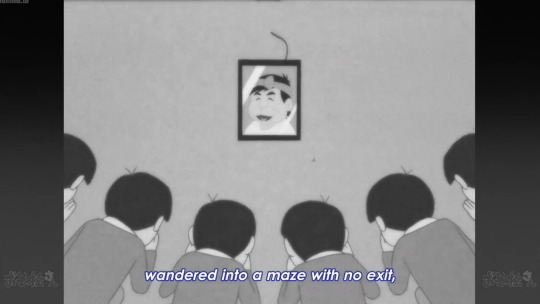
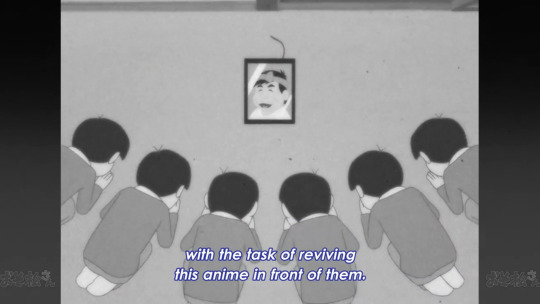
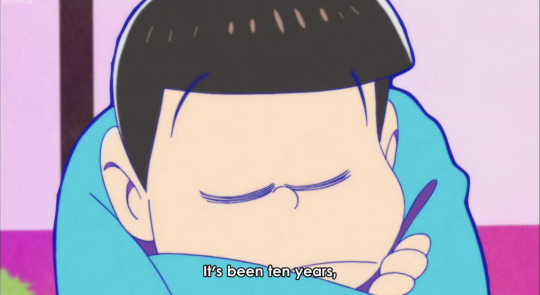
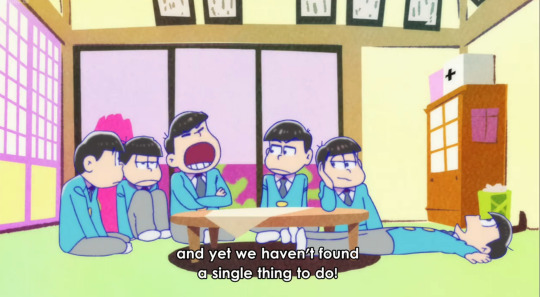
Right off the bat S1E1 makes it clear what to expect: Nothing. Not a damn thing. But, the show had already been cleared for this first season, so it has to be produced. This same episode’s preview is done by Osomatsu, which I’m just gonna quote instead screenshot because there’s too many.
“...we plan on properly starting the anime the next episode.” “...you ended up with an extra minute, so you need me to do something to fill it?! Actually, is this anime going to be okay with episode one being like this? I’m getting worried about how the rest of this is going to be...” “There, I used up a minute! [EPISODE ENDS]”
Episode one is not only batshit referential, but downright mocking the state of anime in 2015. Which, truthfully, I don’t have much to comment on in that regard, as I’m not an avid anime fan. However, it does this under the premise of being indecisive about what kind of anime they wanted the Osokun reboot to be.
They’ll do just about anything to stay popular and relevant considering that is, quite literally, all they have going for them as characters in the series and just being characters in general. They may be pieces of shit, but they’re likeable pieces of shit. The dynamics they’ve built upon to be entertaining is encouraged, and they’re basically just roleplaying different skits and fucking around.
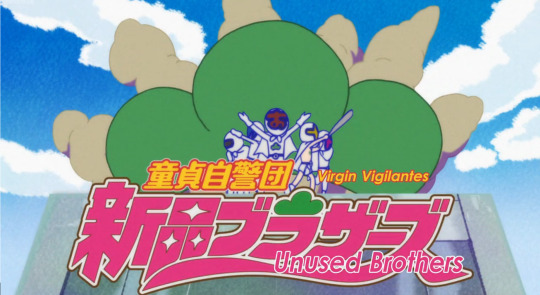

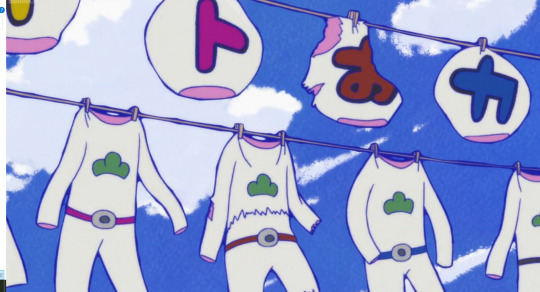
All the AUs! All the skits! They’re just playing! They’re just fuckin’ around!! They couldn’t come up with any interesting plot nor could they “graduate” from being anime protagonists and join the real world, so they just fuck around and make a gag anime!
Even if we follow both as the audience, the show makes a difference between the what’s them in their “normal life” (crazy begets crazy, no?) and what’s their “show.” But, really, that’s just one way to look at it, as they don’t really follow any rules as a show. I could say the Joshimatsus are separate characters from the sextuplets, and it’d be a “correct” interpretation. It doesn’t really matter - I’m choosing to examine it all as being the six of them just running around and playing, because being entertaining and having fun is all they know as characters. Besides, having it blended together beyond recognition reinforces how it prioritizes entertaining us, the audience, above logic. Storytelling doesn’t need to make absolute spatial-temporal sense for it to be enjoyable to fans.
In any case, that mentality really seems to be what pushes their character development negative, as they look to reinforce habits and rituals despite them being really detrimental for them in the long run. They know they’re popular characters as is, and with really everyone from staff to fans encouraging this behavior further, so they see no point in fixing what isn’t really broken.
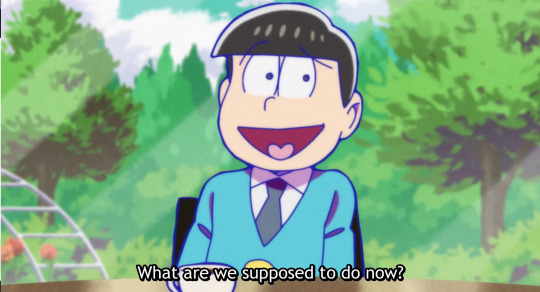

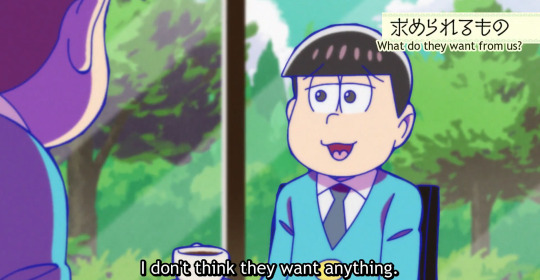
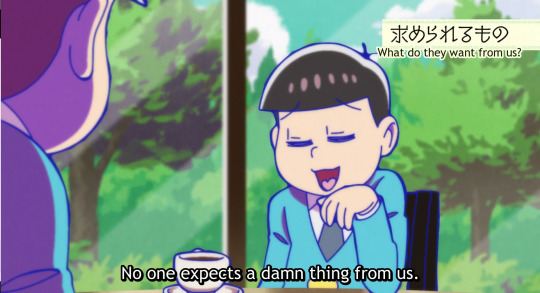
I found this 4 year old article from Manga.Tokyo discussing the Ososan phenomenon in Japan because while the craze died off pretty quickly in American anime circles (which deserves a whole other post), Japanese fans went fuckin’ nuts.
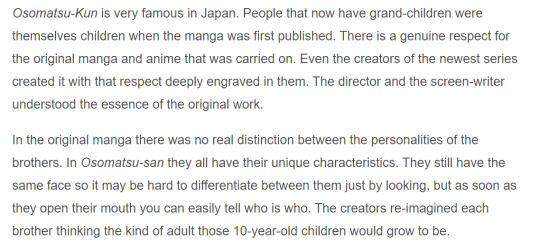
This portion caught my attention, as it makes sense that entitled and enabled asshole children would grow up to be entitled and enabled asshole adults. The article also goes on to compare them to idols (even beyond the F6 spoof) and that they are rooted in being comfort characters above all else.
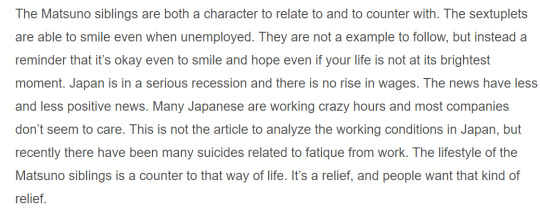
It’s worth a read, especially because Japanese fan response is what drives majority of the content post-S1, and, inevitably, ties into their character development.
They know that they’re Characters, particularly Protagonists. You know what happens to protagonists? Everything works out. Just about every single story created has stuff working out for protagonists. In fact, we have a whole genre made that separates stories with bad tragic endings from our Normal Stories. Ososan is a comedy, not a tragedy, so surely there’s gonna be some payoff somewhere along the road, especially as the seasons and other content are still being pumped out. To a self-aware, entitled, enabled protagonist, assuming everything is just gonna work out for you isn’t that far off from your narrative truth.
However, Ososan is a gag anime, and a lot of gag content (like 4koma mangas) is dropped for other projects before any emotional cathartic ending is provided for characters and fans alike. So, three seasons and a movie later, nothing has happened. It’s a great idol cash cow with a Family Guy filter, and the characters (and writers) don’t even bother to hide it anymore. And I know I’m being hypocritical concerning my definition of “canon material” but I think this portion from one of the drama cds “Choroplex” basically summarizes my point:
CHOROMATSU: Wait, don’t make this into a gag! You don’t even care about becoming employed, right? KARAMATSU: There’s no way that could happen... CHOROMATSU: What kind of future are you imagining? Is it nothing but this? [HUGE PAUSE BEFORE THEY MOVE ONTO SOMETHING ELSE]
They’re parodies of themselves and are running out of ideas. Stagnation and decay is normal, if not unavoidable, at this point in time for them. They’re just 20 somethings who’ve hit a wall but they’re too scared and insecure to bring about permanent positive change. It’s easier for them to fall back into normal patterns and joke off the rest.
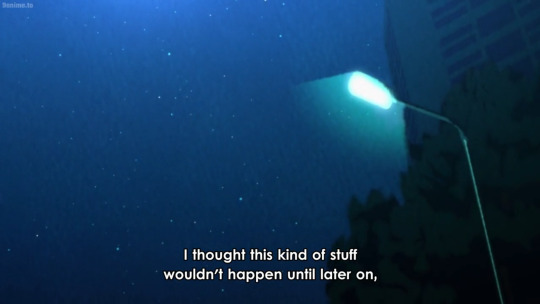
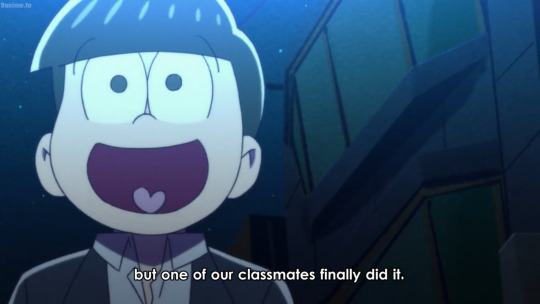
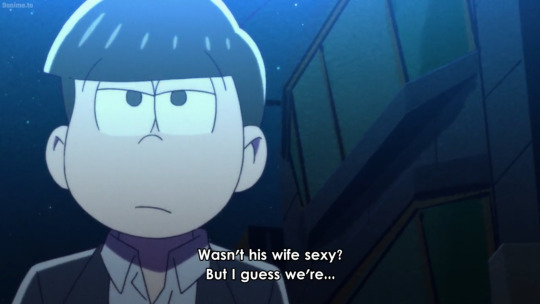
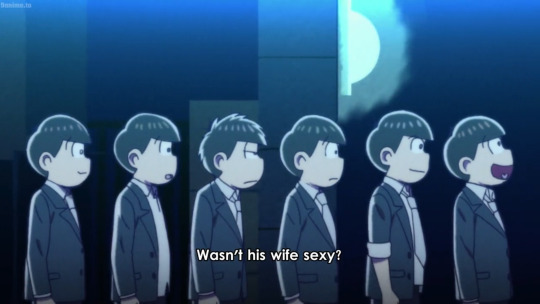
They have an antagonistic relationship with expectations. They can’t handle a single iota of expectations, or responsibilities. They’ve never needed to worry before, so why bother now? Once the biggest hits on the block, now they’re just guppies in the ocean, and there’s nothing they believe themselves to be able to accomplish to keep up with this big brave new world. This is epitomized in S3E15, where old man Osomatsu tells a bastardized version of the Tortoise and the Hare, blatantly projecting his feelings onto it. Again, too many screenshots so let me pull more quotes (bolding for my own reference):
“The place that the tortoise thought was the goal was not actually the goal. His journey down the road of life still continued on. The tortoise was quite tired, but he continued running anyway.” “No one actually knew who was in front anymore. There are too many people above you.” “After the tortoise found out how society worked, he thought, ‘So this is the difference in talent? No amount of hard work is going to fix this. All right. I’m done competing with others.’”
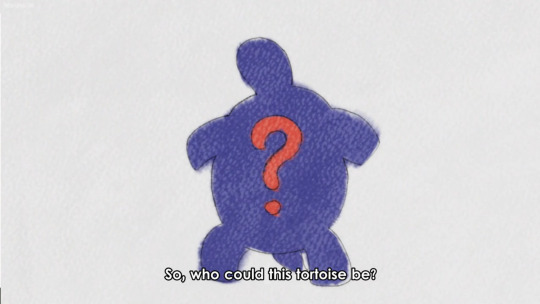
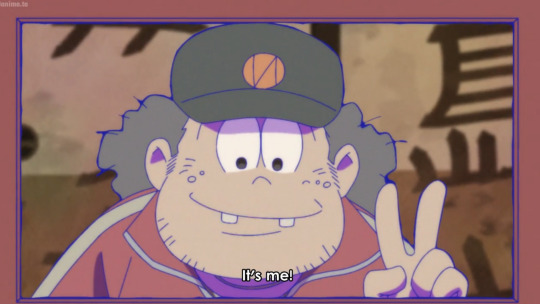
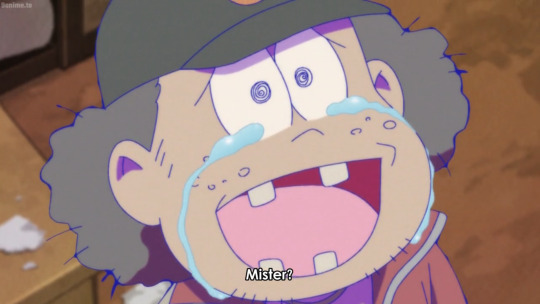
S3 has left more questionable endings than its counterparts. The last 2 skits I referenced don’t even a gag to them, and the marriage skit doesn’t play music for the entire second half of S3E5. There’s more involved too. I haven’t even brought up the rice ball twins becoming actual entertainers in their universe, or how they introduced this whole AI subplot only to reject it because All Six Of Them aren’t interested in expanding their little corner of the world. Here’s a transcript of the ending preview from S3E1:
“Hey, hey, Osomatsu here. I thought we were saved from being replaced, but I guess we get new characters next week. Man, we’re busy. New encounters, changing surroundings... We’re NEETs to begin with because all that is a pain. I guess a lot can happen after three seasons. [EPISODE ENDS]”
The sextuplets’ mindsets are extremely self-centered, which is also an environmental thing (the parents don’t even really care that they’re NEETs, for one) and an understanding of what they ought to be (epic successful protagonists). They also have a very black and white mentality, all or nothing. They’re extremely sheltered, and once they realized where they stood in society at large, they just gave up. To them the world is divided between winners and losers, and somehow, “inexplicably,” they found themselves to have fallen from grace. But they’re protagonists, that has to count for something! Everything’s gonna end up okay, right? Well... what this show has told them: No, not at all. They are consistently compared and warned of Iyami, and are perfectly aware of this fact, and have come to internalize it as a truth rather than a reversible self-fulfilling prophecy.
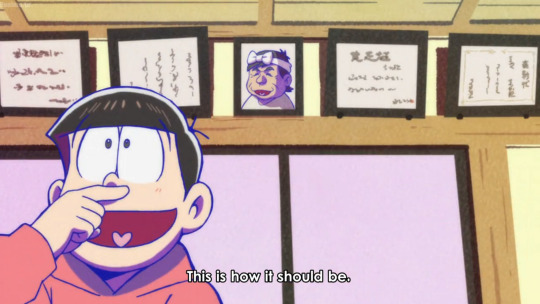
Too many screencaps, taken from the S3S5 marriage discussion:
JYUSHIMATSU: I wonder if we’re gonna get married someday, too. CHOROMATSU: Well, I mean... probably? I’m not exactly sure, but... TODOMATSU: What? You’re gonna get married, Choromatsu-niisan? CHOROMATSU: Huh? Well, yeah... someday.
Surprise! They have commitment issues! The same group that couldn’t commit to a fucking plot! Though their personality issues have several factors involved, I can’t overlook the theater motifs abound. Life’s a stage, and they’re performing entirely unscripted and it shows.
Do I think all of this is 100% intentional on the writers’ part? No, probably not. There’s also an extra layer here regarding contemporary Japanese commentary that I’m not familiar with, so I just ended up focusing on the characters. I can’t be in the writers’ heads, but whatever decisions are being made by executives regarding censorship and “compliance” are reflected in these character changes that result in being significantly more bitter and defeatist.
In the all or nothing, winner-take-all mentality, the only way to save face at this point, in their minds, is to own up to it - act like it’s what they wanted all along. And, hey, it’s funny to watch, right?
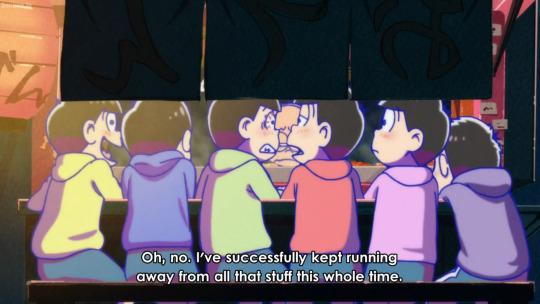
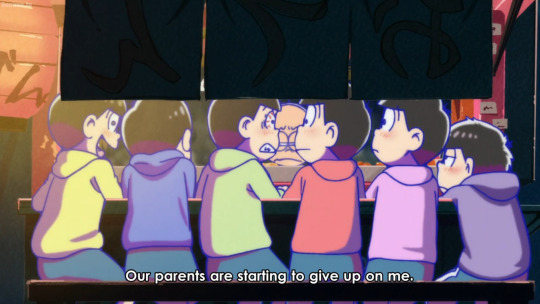
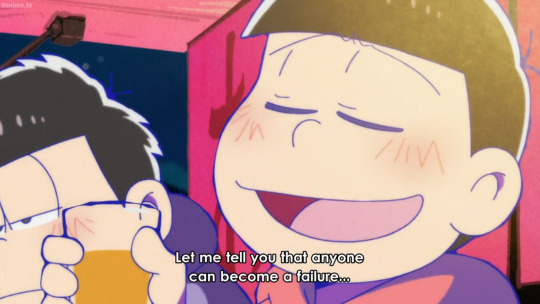
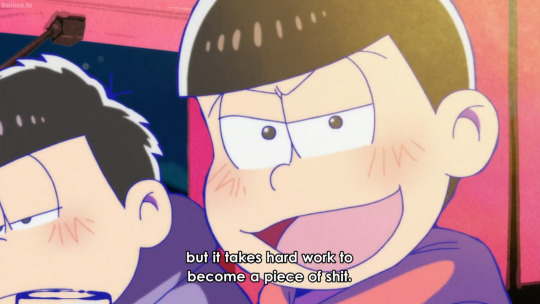
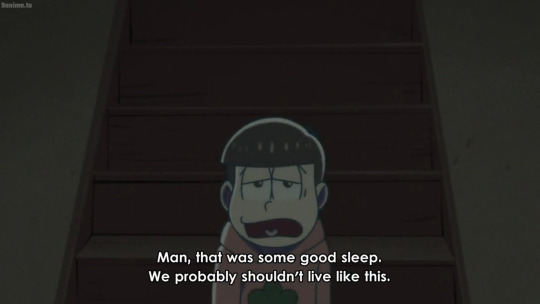
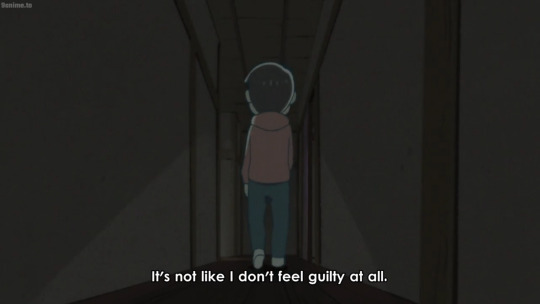
“Why is Osomatsu all my examples”, you might be asking. Well, he’s the damn blueprint for it all. The leader of the bunch, the first personality to grab your attention, has had all his issues projected and ricocheted in their echo chamber.
Ultimately, my point here is that you could think their “canon characterizations” (though canon means nothing in a show like this) as being intertwined with the nature of their self-aware existence. They’ve shown you all their tricks, the smoke and mirrors are getting boring, and they’re stalling long enough the story seems to be moving on without them - in spite of them. And when something genuinely threatens their way of life, they don’t know how to respond.
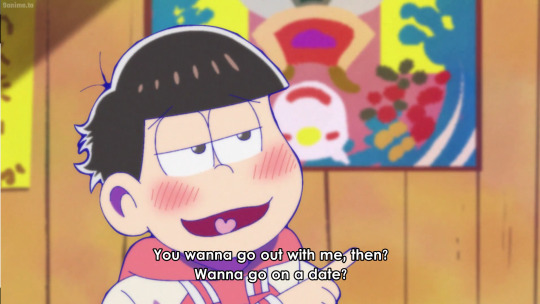
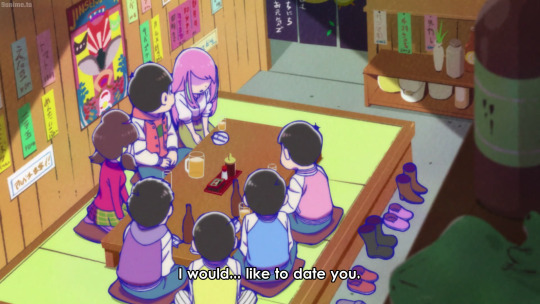
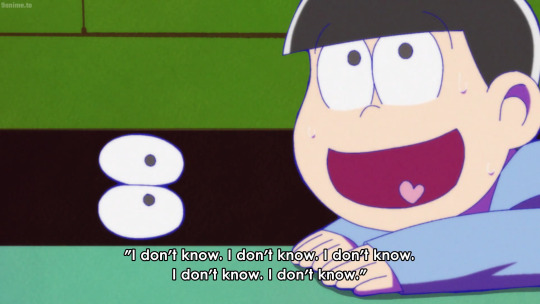
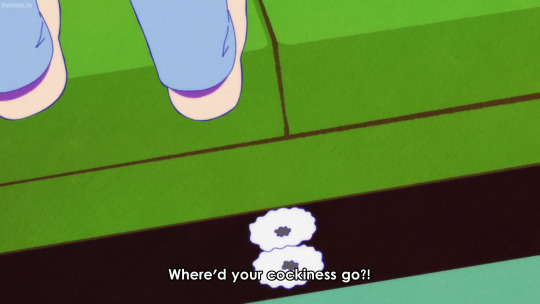
You can play it all straight, of course. Remove the meta jokes and all the same plot points can be hit, but, as a slapstick comedy, it’s able to easily add this additional layer in that I appreciate. I’ve said it in my last post and I’ll probably say it in more, but with comedy comes sincerity - the caveat of all the cartoon violence is that, on some level somewhere, this is how they really feel.
#osomatsu san#osomatsu#karamatsu#choromatsu#ichimatsu#jyushimatsu#todomatsu#osomatsu matsuno#karamatsu matsuno#choromatsu matsuno#ichimatsu matsuno#jyushimatsu matsuno#todomatsu matsuno#analysis#confession this was sparked by a convo i had w friends about s3e18#this is a bit truncated but i couldnt bring myself to make this longer#maybe ill make a pt2 or whatever idk
121 notes
·
View notes
Link
LETTERS FROM AN AMERICAN
May 5, 2021
Heather Cox Richardson
With Trump loyalists consolidating their power over the Republican Party, Representative Liz Cheney (R-WY) today launched the Republican opposition.
Cheney is currently the House Republican Conference chair, managing committee assignments, media appearances, and certain debates in the House. Her refusal to whitewash the January 6 insurrection and to support the former president has led him to press for her removal from her position as the third most powerful House Republican.
House Minority Leader Kevin McCarthy appears to have caved to that pressure. A vote will likely take place next week, and observers expect Cheney to lose. Trump loyalist Elise Stefanik (R-NY), who voted against counting the electoral votes for Joe Biden on January 6, appears to be the front-runner to replace the Wyoming representative.
Cheney laid the stakes of this political moment out starkly in an op-ed in today’s Washington Post. Trump continues to lie that he won the 2020 election and that Biden is an illegitimate president. That language provoked the violent insurrection of January 6 and, according to judges and prosecutors, still threatens to rally his supporters to attack the government.
And aye, there’s the rub: Trump has borne no consequences for the January 6 crisis, and there is every reason to believe he will spur his supporters to make similar efforts to install him as president again in the future. “Trump is seeking to unravel… confidence in the result of elections and the rule of law,” Cheney said. “No other American president has ever done this.”
She called for a bipartisan review of the January 6 insurrection by a commission with subpoena power to dig into what happened, and said that no member of Congress currently serving should participate. Instead, she proposed tapping former officials, judges, and other prominent Americans who can be objective. Rejecting calls of Trump loyalists to muddy the waters with a general commission that looks into the Black Lives Matter movement as well as the insurrection, Cheney wrote that a careful examination of the events surrounding January 6 is imperative to stop the “misinformation and nonsense circulating in the press and on social media.”
Such a commission would almost certainly want to interview a number of Trump loyalists, including McCarthy, who had a phone exchange with the former president during the insurrection that observers say devolved into a shouting match. It seems unlikely that all of those interviewed would come out looking good. Having thrown in their lot with the former president, Republican leadership is now yoked to the testimony about the insurrection—and the videos—that will come out in the future.
“The Republican Party is at a turning point, and Republicans must decide whether we are going to choose truth and fidelity to the Constitution,” Cheney wrote. “History is watching. Our children are watching. We must be brave enough to defend the basic principles that underpin and protect our freedom and our democratic process.”
Cheney is no Democrat. She voted with Trump nearly 93% of the time (compared with Stefanik’s nearly 78%). It is impossible to argue that her opposition to Trump is partisan, which makes it all the more powerful. She looks to be trying to reclaim the Republican Party from Trump and his supporters, and she has a decent shot at it.
First of all, she is already getting a lot of airtime, and being tossed out of House leadership for refusing to lie will get her even more. She has the backing of the low-tax, no regulation, military hawk, business side of the party, which also happens to be the side with the most money. Corporations have been dragging their feet at supporting the Trump wing; she will offer Republican policies without the overthrow of the government.
The anger of Republican lawmakers at corporations withholding money from those who backed the insurrection suggests they are keenly aware that they will have to turn entirely to the Trump base for cash. According to Greg Bluestein of the Atlanta Journal-Constitution, South Carolina Senator Lindsey Graham brought this up last night when he spoke at the annual fundraiser for the Georgia Republican Party. Informed that corporations had been reluctant to chip in for the event, Graham said: “I don’t know how much money you lost from these corporate sponsors not giving you money but I’m gonna get on Sean Hannity’s show we’re going to raise every penny of it back—and these people can kiss my ass as far as I’m concerned.”
That quest for money from the grass roots is behind at least part of today’s outpouring of fury from Trump loyalists after Facebook upheld the former president’s ban. Facebook was key to Trump’s power: he used it to gin up his base’s anger and then to get his supporters to send him money. Losing that platform weakens him.
For his part, the former president today attacked Cheney, and also Senate Minority Leader Mitch McConnell and former Vice President Mike Pence, whom Trump blamed for refusing to stop Biden’s election. Far from abandoning the Big Lie, Trump doubled down on it, insisting that the 2020 election was fraudulent. If only Pence and McConnell had been stronger, he wrote, “we would have had a far different Presidential result, and our Country would not be turning into a socialist nightmare!” He ended with words that proved right the concern that he will continue to back attacks on our government: “Never give up!” he wrote.
Pro-Trump Republican leadership is now tied to that mess. Cheney and those who might rally to her side are not.
While today’s drama played out among the Republicans, Biden and his administration kept moving forward. When asked about his support for Cheney, Senate Minority Leader Mitch McConnell said simply, “One-hundred percent of my focus is on stopping this new administration.” Asked about McConnell’s comment at today’s press conference, White House Press Secretary Jen Psaki said, “I guess the contrast for people is 100% of our focus is on delivering relief to the people and getting the pandemic under control.”
—-
LETTERS FROM AN AMERICAN
HEATHER COX RICHARDSON
#Letters from an American#Heather Cox Richardson#corrupt GOP#criminal GOP#lies#January 6 2021#insurrection#history
3 notes
·
View notes
Note
The superhero genre is the result of power-fantasies. Heroes were created to be better than police, to do the work cops failed to do... However, the writers behind those heroes were and continue to be human- humans who often do not fully understand political conflicts and class issues. Many of those heroes were created by Jewish young men, who then made the characters fight killers, corrupt authoritarians and Nazis. While having noble origins, the genre often failed to address the root cause of minor quotidian crimes. Rarely would the stories also acknowledge the damage caused by these vigilantes throughout their fights. Superheroes often turned vaguely authoritarian, albeit not intentionally, because their definition of justice obviously must not be questioned by readers, it is all-righteous.
But even though these occasional problems were already enough to make some of the stories sketchy, American politicians definitely made it a much more structural problem when they led to the creation of the Comic Code Authority in the 50s. I will not go too much in depth into it on a Tumblr post, but I've linked the Wikipedia article on the CCA for anyone curious. Imagine The Hays Code but for comics, except it wasn't completely defunct until 2011 (althought, of course, many alterations to the code were made throughout the years.)
All the problems I mentioned before became, essentially, an actual mandatory part of the story. Criminals now could never be sympathetic characters, and always had to be punished accordingly, and it just didn't matter whether they were only a small fish or an actual crime boss, they all had to be treated the same. Everyone deemed a foe was inherently irredeemable. Worse still. Police, which was often portrayed as faulty in early superhero comics (because, again, superheroes were meant to be better than police. They were meant to fight crime cops refused to, or just couldn't), could no longer be portrayed as flawed, and neither could judges or politicians.

Superhero comics just became cop propaganda. There is literally no way to deny this. It was publishers' law. Writers found themselves having to retcon and censor many things so their stories wouldn't be rejected! And propaganda works, because many future writers would grow up and write stories with all the same familiar dubious themes, even after the code changed and became more permissible. But hey! Things are starting to get bette-
Weeeell.... While, yes, more and more writers have been able to publish subversive stories and explore themes they wouldn't have been allowed to before... What was the last mainstream superhero movie you watched? Were there tanks in it? Were there military personnel? Was it a Marvel movie?
Did you know that the American Military and the Pentagon lend out money and military props to studios? And in exchange? They get to edit the script as they please. Large scale destruction and mass deaths are now purposefully ignored in plot, they have to be written like these catastrophes were needed for the better good. To fight against a great evil, tragedies are inevitable, don't question it. Here's a little beginner's read.
While this post was originally about MHA, a Japanese franchise, the Superhero genre is an American genre. It's nearly impossible to find a Superhero story that hasn't been influenced and shaped by Marvel and DC. It is no secret that MHA took great inspiration from western comics.
So it is then, my argument, that Superheroes are not just cops. They're much worse. They are a show of all that is wrong with authority, and they cannot escape it. No matter how much writers try to run from the american superhero stereotypes, it runs way too deep to be fixed any time soon, especially by mainstream. For this reason the Superhero genre is incredibly fascinating, but also kind of horrifying. The way Jewish writers, a heavily oppressed minority, created something meant to empower them at a time when they were ignored by those meant to protect them, even if at times flawed, yet the American Government took it from them and turned it into propaganda. The way politicians forced writers to weaponize their characters during the Cold War, the way they were forced to glamorize the police and war, the way capitalism and fascism corrupts everything it touches. I think it's all very interesting, I love Superhero comics! 😁👍
Is MHA pro-cop propraganda? Because it definitely seems like it
I think that even bothering to litigate this when talking about standard superhero media is kind of pointless. it's a superhero story based strongly off of the comic book tradition and it's a fairly by-the-books one, so it's not exactly uniquely egregious or uniquely subversive
so, yes, but it didn't have to really do or say anything to be so. it's like asking if sword and chivalry media does anything to launder the image of knights
661 notes
·
View notes
Text
A lengthy, LENGTHY post on keeping yourself mentally safe AND politically active during this time of racial/political unrest
I wasn’t expecting the need to do another writeup again, but here we are, haha Taking this break day to discuss the NEW giant elephant in the room: the US has flared up in a gigantic racial conflict again after the high-profile death of another black American at the hands of the police. There’s no beating around the bush since everyone’s already talking about it, and if you haven’t heard about it til now (which hey, my analytics say some of you are pretty young, so I wouldn’t blame you), it’s been a greatly aggressive mess that everyone is feeling the pressure of getting involved in. Now, I usually don’t like getting publicly political, but that doesn’t mean that I as a creator am not a political person. Far from it; the moral matters of how people should be treated, what constitutes as “justice” and what to do when “injustice” is committed, are all very important subjects that we eventually learn to form our opinions on through life experience and interacting with the world, and will always remain relevant due to how we exist in the world under governments and cultures. It’s dishonest to say we have no belief in stuff like that, and ultimately unhelpful to deny our say in it. Politics are very important, and they matter. But I’m not here to get into a full filibuster about why you should support Black Lives Matter and be informed of the protests going on and what motivates them. The thing is that I trust all you lovely monitors and have the faith that we’re generally on board with at least adjacent beliefs in how the world should work -- the life of innocent people matters, racism and other forms of hatred are bad, killing people is bad, the misuse of authoritative power is unjust, etc. If someone asks me to explain in a multi-paragraph spiel why I believe people should believe these things since they think otherwise… I’ll kindly tell them “no”. Instead, similarly to my COVID-19 writeup, I just want to talk about some tips to help deal with the day-to-day of this ongoing conflict; not necessarily discuss politics in deep detail, but rather the handling of politics in your everyday life, especially during times of controversy. This is a VERY rough time for many people, online and off, and I think it’s as important to keep yourself healthy during this time of extreme tension as much as it is to stay strong regarding the conflict in which we are all in one way or another embroiled in. This writeup might be a little cluttered and clunky since many of these points are greatly interconnected, but just bear with me through this, and I hope the points I make will make sense in the end.
=========================== 1) JUSTICE IS THE BOTTOM LINE =========================== Let me establish something as clear as I possibly can right off the bat: The ultimate goal of rebellion (especially this one based in activism towards the better treatment of black lives) should not be to create stress to psychologically destroy everyone in the vicinity, but to inspire change for the better. The systemic allowing of authorities to misuse their power for hateful purposes should not merely be a seen as an excuse to get angry at the world, but an injustice that must be corrected, and the bottom line of protest is not merely agitation, but actual change. I feel like this should ultimately be pretty obvious for a lot of people, but because change is a very difficult thing in general and because the protests have provoked turbulent response, it’s very easy to lose sight of what we’re actually doing and why, especially for the young adults whose first exposure to complex and nuanced politics is through times like this. Make no mistake, at the end of the day, getting justice for George Floyd and the countless other African-Americans lost to police brutality is the goal. So… why is this controversial? Well, because... =========================== 2) POLITICS ARE COMPLICATED (AND WHY WE MUST BE CAREFUL AND PATIENT WITH IT) =========================== Kind of an obvious statement, but politics are VERY complicated, often to the degree that they can be extremely overwhelming, especially to the young and inexperienced. So I want to start by just making some sense out of the chaos to make what we’re all dealing with more digestible for later. There’s a lot of ways politics can be controversial that I feel should be obvious on a fundamental level of “not agreeing”, but the facet I want to focus on is the fact that in discussion about what’s “morally correct”, morals are not synonymous with the rhetoric and methods with which they’re presented. Often times, people who agree on the same target goal will disagree on the actual means of getting to that goal. We’ve all been in the situation where we got angry at someone for saying something in a really bad way, and frustrated because we also thought “...they still have a good point,” but the delivery made both of us look bad. This is everywhere in politics, and is also just a fact of life and humanity; everyone will have their own opinions on what to do and why to do it, and they may not all be completely the same. That doesn’t mean that people who you don’t 100% agree with are definitively less worthy of being on your side, nor does it mean that people you don’t 100% DISAGREE with are suddenly worth your time. The point is that nuance should be expected… and that’s not unforgivable, contrary to what some people might want you to believe. There’s a frustrating narrative that’s sadly common (or at the very least, disproportionately vocal) within activist movements which social media isn’t helping with, and it’s the classic “you’re either with us or against us” philosophy. Again, this can manifest in many ways, but the prevailing modern take is the oft-unspoken assumption that anyone that doesn’t immediately qualify as an ally must be considered an enemy, ignorant, and/or at the very least worth showing contempt to unless they do something that suddenly makes them qualify as an ally. In other words, assuming the worst of people until proven otherwise. I’ll go into more detail about this further down, but simply put, I do not agree with this approach at all because it inherently roots itself in the presumption that personal philosophies are set in stone, and that it requires a Herculean amount of effort on the other party to change for you. Yes, YOU, the absolute moral victor who not only never needs to change or rethink anything by virtue of being the victor, but also gets to choose what counts as acceptable in the first place. This is not to say that activism is inherently dishonest or bad, merely that again, politics are complicated. This current Black Lives Matter boom and the various responses to it are very complicated, and despite this movement being a thing for a while now, not everyone is an expert on everything that happens and why, especially as it continues to develop. The most egregiously unhelpful part of the “people who are ignorant are enemies” assumption is that it forgets not only that ignorance is the default state everyone born into this world starts as, but also that everyone is perpetually still learning, and no matter what, it’s always possible to change your mind, whether you're 15 or 50. In turn, this implicitly encourages the rejects people who DO want to be accepted as an ally to a cause they ultimately believe in to rush into action just to stop being antagonized for not “getting it.” For your own safety: DO NOT RUSH INTO POLITICS, especially since the current-day responses to some of this conflict can get dangerous. It’s not even a case of getting peer-pressured to getting into a live protest only to do something that gets you shot at with rubber bullets -- you could end up saying something you didn’t realize was insensitive until it was too late, you could mistakenly contribute to a false charity fund or untrustworthy organization merely posing as an activist group, or basically anything that only affirms peoples’ perception of you as ignorant. Please, take your time. As sucky as it is to deal with peer pressure from the toxic people on your side, also remember that you’re not alone. Not just in the sense that there are people who want to understand and become better and more informed like you, but also that there are people who are on your side who WANT you to become better and more informed and will understand if it doesn’t come immediately. Being able to safely say you holistically “understand” is a process that requires a lot of time and thought ruminating about your morals and your place in the world (like, to adulthood at the least, basically), and I can say for sure that many people involved in these activist movements have grown up still understanding that. Also (and this is just a thing on life in general), don’t let mistakes damn you. While everyone should strive to do their best, especially regarding matters as critical and controversial as racial inequity in the justice system, mistakes should not be completely inescapable dead-ends, nor should they be seen as such. Every misstep is a hidden lesson. Did you fall into the trap of misinformation? Give yourself new perspective of what misinformation looks like to avoid it in the future. Did you realize that you’re being strung along in potentially negative action you don’t understand? When you’re skeptical, do your research. Did you end up in a confused place because the causes you followed have come into conflict? Give the time to reassess what you fundamentally believe in and why. In short, Be patient with what the world throws at you. Your friends and allies will love you more for being careful and smart than merely being the first to say something. =========================== 3) REMEMBER TO BE PATIENT WITH YOURSELF TOO =========================== Now I realize that the suggestions I just shared in that last section might read off as being easier said than done, which... yknow, it is. Again, change is difficult not just on a system level, but on an individual, personal level, even when they have to do with the same thing. But now with all that backdrop out of the way, let’s talk directly on mental health. Again. I’ve already discussed my thoughts and tips on keeping your mind healthy in the context of the COVID-19 lockdown (which still is important since the pandemic is still going on, LINK: https://www.twitlonger.com/show/n_1sr7go6 ), and most of the stuff mentioned are still applicable to this new climate that I generally recommend still being practiced on a personal, self-care level: understand that even at the darkest, there will be dawn, keep yourself stimulated with regular activity, and be sure you get plenty of healthy sleep so you don’t spend your waking days tired and unable to lift yourself up. Of course, this is a new situation where the priorities are a lot different, namely that rather than merely keeping your sanity during a very passive time, this new situation is about social interaction, participation, and in general being active in big, drastic ways. That said, I don’t believe the fields are mutually exclusive -- I believe you can act for the greater good while preserving your own health, despite what some might be saying. Going back to that bit of internal gatekeeping of “you’re seen as an enemy until proven otherwise,” another part of what makes this thinking ultimately harmful is that the “line” which “separates” ally and enemy can be incredibly hazy and effectively whatever it wants, with the biggest narrative as of writing being that “silence means you’re complicit in allowing evil, and that if you don’t ever speak up, you’re a bad person.” Now there’s a lot to unpack from this, because this is a case where there is a good point, but it’s buried in vitriol. There ARE valid reasons for why someone would stay quiet, namely that not everyone has the same emotional/psychological bandwidth. Maybe people are having breakdowns because everything in the world angrily and violently collapsed onto them at once. Maybe they had burnout because the exposure dulled them of their usual ability to care. Heck, maybe there’s a way more corporeal issue in that they’re afraid for their own safety because of what they do or don’t say and are afraid of the consequences being literally dangerous, like they might lose their job or are gonna get targeted IRL. But does that constitute a free pass to sit this entire movement out? Well, as nice as it would be, the answer is “no”. Once again, the point of this movement is achieving justice, which I believe is a very worthy cause to take part in should we have the ability to, and I’ll be sharing stuff further down for those who can (and I believe most of you can). But the important thing to know now is that we and our brethren are not completely equal in terms of how smart, vocal, durable, or ultimately able we are, and that's FINE. I want you to know that just because you might not be as big in that regard as your peers, that doesn’t instantly make you “less” of a good person who can do great things, and I don’t think it’s at all wise to see action in a "flawless", black/white way. We all matter. And now is a time to do our best to stand united with our friends to affirm that black lives matter. Now, before I share in tips on how to go about being an active participant, since you’re here reading this huge-ass essay, this is a good time to reflect on where you stand from a mental health perspective, which is just as important and should be regularly checked upon as brushing your teeth. In addition to more visceral emotional reactions like secondhand trauma, other things like burnout and depression don’t just suddenly APPEAR. They creep up on you over time through prolonged stress, and they should be identified before they become a really crippling problem. No matter how passionate you are about advocacy and how much you believe in yourself, recognize that we are all still human, and that there are times that we need to stop, relax, and breathe. (like, literally! Take slow, deep breaths!) Ask yourself: are you physically feeling fatigued? How often? Is your overall morale good? What is your frequency of good to bad days, and is there any correlation you can find that dictates when they occur? Do you get instantly anxious and depressed when receiving certain stimuli like bad news? What about “good” stimuli like being empathetic or compassionate? Give yourself a patient, honest answer: how “well” do you feel? Like from my COVID-19 post, I want to remind that I am not a doctor who can necessarily prescribe things like therapy or give definitive treatment for every individual who reads this based on how they’re doing, and these suggestions are more stuff that I believe will help cope and take care of yourself just from experience. With that being said: • If you are feeling constantly exhausted, finding yourself unable to consciously self-care or work, I cannot recommend a healthy, regular sleep schedule enough. Do your best to be honestly consistent about it, your body and mind will thank you so much for good rest! • If triggering topics are festering in your head, learn how to practice meditation and grounding techniques. Meditating and grounding can be regularly used to help sway your mind away from the harsh topics your mind may wander into and fixate on in any given moment, and can be very helpful in allowing yourself to clear your mind from stress, as well as to refocus on what you’re really experiencing in the present. There are so many ways to approach these forms of treatment to try out, but just some online resources to get started: https://www.theawakenetwork.com/free-online-meditation-resources-for-the-time-of-social-distancing/ --- https://www.healthline.com/health/grounding-techniques • If the constant exposure to these ongoing, intense news and their discussions are becoming too much for you, it is completely within your right to turn off your social media, news, and halt your advocacy in general for a bit. Again, these are important, crucial topics which we ultimately fight for because we believe that things should be better, but if you start to feel legitimately traumatized and unable to properly handle new information to work, you don’t need to continue exposing yourself to it. Give yourself a break from it, you can join back any time once you feel strong again. • Stay connected to the people you trust. I firmly believe that empathy and friendship are more powerful than any kind of indirect threat like peer pressure in helping you stay productive while happy. You were probably already doing this because of the COVID-19 stuff, but now is especially a good time to come together with your friends and loved ones. No matter what, we all need our safety, reassurance, and love, and while we may not always be able to unload all our grievances onto each other (everyone has a right to their own mind they should take care of), there is nothing to be ashamed of in seeking out solidarity. That is a big thing with a movement like this, after all! • If you really believe you need professional help for constant distress, then genuinely good professional help is out there. If you have concern in finding proper mental health treatment (especially for black people), programs out there specifically with it in mind. https://twitter.com/mayarichardsun/status/1265676677549559809 One last point: it’s also important to understand that coping isn’t exactly the same thing as “self care”. We all have an obligation to act in ways that can in one way or another be seen as stressful, but also understand that not all methods to cope with it are equally healthy. What I suggested are very low-maintenance, low financial cost techniques, but there are other techniques like spending cash on clothes or (for some of us), binging on alcohol or other substances. Techniques like that aren’t strictly invalid as coping tools in moderation, but understand that ultimately, self-care is a form of reducing the harm you receive, and it isn’t necessary to cut into your finances or physical health just to not feel bad. Be safe about how you cope! =========================== 4) READY? GET SET. GO! =========================== There are so many ways that you can help with the Black Lives Matter movement that honestly, I’m kinda nervous about going in great detail about all of them since I feel like I might misword stuff that explains themselves very well already, haha. But here is a big, constantly-updating resource that I currently trust and follow: https://blacklivesmatters.carrd.co This Carrd page by @dehyedration is a very extensive page on “Ways You Can Help”, with links of direct support and additional educational guides for those who wish to be further educated (which should be all of us!). Included are: • Petitions to sign for justice not just for George Floyd, but other victims felled to police brutality (very low-cost and contains details for international). • Text/call contact info towards local govt. representatives who can bring George Floyd and others to justice. • Links to donation funds towards the victims, the protesters, to black-owned businesses, and other charity institutions (includes a segment for international links!). • Guides for live protesters, compiling resources for understanding your legal rights, links for assistance (including access to pro-bono lawyers), and tutorials on how to stay safe and treat injuries should things get hairy. • Additional resources on educating yourself on the topics of Black Lives Matter’s rhetoric and goals, the issues of systemic racism at large, debunking of common misinformation and outright hoaxes, and more! There are MANY way to contribute to the cause right now, and a surprising amount of it you can do in virtually no time. Signing the petitions alone can be all done in 5-10 minutes (give or take, given how many tabs you can open and keep track of at any certain time haha), and even if you can’t donate, there are so many ways to you express your support without needing to have to deal with pointless fights against Twitter trolls. Once again, I firmly believe that contributing to and being aware of a powerful, meaningful cause and keeping your sanity are not mutually exclusive. We can act for the greater good, and we can be healthy about it, so long as we remember to be patient with the world as much as we should be patient with ourselves, and together, we can do amazing things. And one final reminder: just because this is an important subject we should all do our part to get involved in this, that doesn’t mean you must sacrifice everything else in your life right now. As important as the discussion is and as critical a time it is for it to be visible, that doesn’t mean that you should be completely engulfed in it. You can still enjoy what makes you happy, healthy, and motivated enough to take part in this movement. To paraphrase many a wise men: take it, but you can take it easy! I’ll be leaving you with a link to a Twitter thread I found of a bunch of nice news regarding the ongoing protests, which contrary to what a lot of the media might say, is not all looting, fires, and tear gas. The people out there ARE there as a show of solidarity as much as much as support, and it's genuinely beautiful. https://twitter.com/tomakeupwityou/status/1266947871686959106 Stay safe, and stay healthy out there, lovely monitors! (and keep washing your hands!) 🖤🖤🖤
4 notes
·
View notes
Text
Lelouch, C.C. and The Arendtian Concept of Freedom and Equality. 1 of ? Political Theory in Anime Series.
I believe this post should begin with a clarification: I don’t consider Code Geass a story imbued with deep philosophical ideas. In all honesty, I find the entire series entirely fabulous and unabashedly silly, and exactly why I unironically love it. I am, however, without irony, a fan of Lelouch and C.C.’s dynamic in the series.
This is not a shipping manifesto. I don’t ship them romantically, although I can say that in terms of writing, their relationship is written with romantic undertones. That’s not the point. I love the dynamic of Lelouch and C.C. because, in terms of engaging to political question, I consider them a good model to Hannah Arendt’s concept of freedom and equality. For those who are acquainted with Arendt’s political thoughts, it’s an outlandish claim, and I can see that, but please humor me on this.
Freedom, according to Arendt, is the capacity of humans, as a collective, to create something new. The American Revolution is a manifestation of this freedom not because of the American liberation from the then British Empire, but because of how the founding fathers treated each other as equals, participating in this public political realm where they have sustained dialogue, sharing thoughts to how they can create a new republic, and to finally institutionalize that freedom.
Freedom is rooted on the Arendtian concept of natality. “Birth” is not simply about the biological process, but is based on her definition of homo sapiens. Unlike animals, humans are distinct because we are all different. In our capacity to think, to speak, to do action based on our thoughts, no human existence will be the same. That’s what frees us from the nature’s “circle of life.” The moment we are born, we already changed something. The heterogeneity of our history is born out of the fact that we are all “contingent and innovative,” and this is where our true freedom lies.
Freedom requires equality and the exercise of freedom is power. A supposed act of “freedom” that is not grounded on equality is not power, but violence. Freedom is always deeply connected to political activity, and hence is connected to the public realm. This public realm is based off the Greek concept of polis, a close knitted society where they participate directly when it comes to politics, where they communicate with each and work together as equal men. A great example of this in the American society, according to Arendt, are the town hall meetings, where a person can participate in politics as a man among men, as a citizen among citizens. As the American Revolution is a manifestation of that freedom, it’s also already flawed. The presence of slavery in the American society is its fundamental flaw. The greatest offence of slavery is not that it has taken away liberty, but the taking away of even the possibility of fellow men to fight for their freedom, since they are not permitted in the public realm.
This freedom and equality, since they are deeply connected to the distinct capacity of humans to think (in the perspective of others, and to judge what they think through dialogues), is what makes people fully alive.
(Hannah Arendt is more subtle in her political thought so everything you think is flawed in this concept is probably because of my misinterpretation.)
So, why is the relationship of Lelouch and C.C. a good model to this Arendtian concept? We all know that the entire basis of their relationship is partnership. They are each other’s accomplice. Their collaboration, their contract with each other, is also what sets Lelouch’s journey to create something new. With the power that C.C. gave Lelouch, ironically the power of violence, Lelouch became fully alive. When C.C. asked Lelouch if he hated her for giving the geass, he said no. He chose his own path, the realization that he now can have the freedom to change something, the capacity to create something new, is what made him fully alive. For that, he was thankful.
At the end of the series, C.C. finally realized that she just didn’t want to accumulate experience, but to truly live. For all the years she has existed, she��d never met someone like Lelouch. What’s the difference? She wasn’t treated something special. Not a goddess, not a witch, not anything but a fellow person, someone you can stand on equal footing. If it means, for Lelouch, to turn into a warlock to emphatically say that C.C. is not alone, that someone can stand next to her as equal, he is willing to be one.
More than anyone in the series, no one knows Lelouch more than C.C., and no one knows C.C. more than Lelouch. They know their secrets, their pasts, and although they did hide things from each other, they express their thoughts with each other as well. But that’s really not the point I want to make here. The thing here, to see each other as equal is a fundamental part of their relationship; it’s what binds them together. C.C. will not have that more open relationship with Lelouch if he started treating her as only a witch, something you only fear, or a goddess, something you only admire. C.C. is achingly human in front of him, because despite his attitude, that’s what she is to him.
Lelouch is not just Zero to C.C., he is not just the Emperor, he is not just the brother. He is, as she is to him, achingly human.
Episodes 15-16 of R2 really embodied this fundamental dynamic between the two. Everything is off, everything became different the moment C.C. treated Lelouch as her master. I also love that little detail they put when Lelouch accidentally cut C.C.’s finger. I like to think that when Lelouch put a bandage on C.C.’s ring finger, is to reemphasize the mutuality of their contract, that like marriage, they are bound to each other, forever, until death do they part. In this case, since C.C. remains an immortal, their contract is perpetual. Which is also a different way of saying that C.C. will never be alone.
Their relationship is this: you value the essence of life, not because of the presence of death, as C.C. finally relearned. You value life because you are alive, and it means there is always something new to experience, because you can share it with others. Because you will never be alone in your thought. You will always have that someone you can have a dialogue with, someone you can share your thoughts with, someone you can make something new with. That when everything is said and done, history really doesn’t repeat itself. And that is freedom, that’s what makes you fully alive.
To quote Lelouch:
“A life without no changes can’t be called life. You can only call it experience.”
What about the fulfilment of C.C.’s wish?
At the end of the series, the camp that argues Lelouch isn’t really dead dead believes so because he hasn’t fulfilled C.C.’s wish yet. He didn’t make C.C. smile yet. I disagree. Lelouch fulfilled her wish. Look at how happy she was at the final clip of the series, when she was having a conversation with Lelouch:

That was a genuine smile. But, then again, to smile is not her real wish, right? Correct. C.C.’s wish is not to die. It’s also not to smile. It’s to be loved. We know this. Even so, Lelouch still fulfilled her wish.
She was loved.
Again, according to Arendt, love is the most apolitical human force. Here, Arendt refers to the love born out of craving. This love in the form of intimacy/craving is fatal, because it’s an expression of escapism, a form of hiding from the problems of society. It’s fatal, because it has the capacity to destroy the public realm, where freedom and equality lies. With Lelouch’s love to Nunally, he destroyed his goal to create a new future, a society with no hierarchy. If not for Rolo, he would not have survived. I would argue, in this case, that Lelouch, more than C.C., seeks intimacy with Kallen the most. Between the two of them, Lelouch loves Kallen, based on the Arendtian definition of love. In two instances, whenever Lelouch lapses in his desire for a different political community, whenever he wants to hide from society’s problem, he seeks intimacy from Kallen. This love is born out of loneliness. More than anything else, it’s a thoughtless action because it reduces a person’s ability to tell what is right and wrong, to maintain the equality in the public. This intimacy that he seeks from Kallen short circuits both of their capacity to communicate with each other as equals. It is without the presence of reflection. It’s a rejection of wordliness. Particularly in his love for Kallen, she is only a phantasm, where he only sees and tries to feed his own craving, and not the person in front of him.
Amor Mundi, or love of the world, is entirely different. It’s a form of understanding with what happened in this world, reconciling the self with the world as it is. It’s an expression of human activity for the the continued creation of human wordliness where we can live together as equals despite our differences. Amor Mundi is Arendt’s articulation of a different love that is not meant to destroy, but to build, to maintain our humanity.
The paradox of Amor Mundi is that it requires a form of distance. To express Lelouch’s attempt to maintain the human wordliness, to re-establish a political community based on equality, freedom, civility and friendship, rather than hierarchy, he has to let go of his desire for intimacy, his craving, with Nunnally, and yes, with Kallen. To seek for their love is to reject their humanity. Hence, why Nunnally had to keep asserting who she is and what she truly wishes to Lelouch, in the same way why Kallen also had to assert herself in front of Lelouch during his lapse of judgement.
So how did Lelouch fulfill C.C.’s wish? He gave her the love of the world. He gave her an answer on how to love the world. Slavery, genocide, isolation, war, pain, betrayal, rejection: C.C. is the embodiment of the complex and contradictory world we live in. How can you love an existence that seems to mock the essence of life? Love is not just between the person and the beloved, but a recognition of the space between them, that the other is not the same as you, and still to love the entirety of who they are. C.C. is what happens when we forget to love the other in a way that we recognize their differences, to see life in the perspective of others, she is what happens when we strip the world of humanity. Lelouch is the only one in the series who embraces (metaphorically) C.C. not despite of who she is, but because of who she is. Thus, he doesn’t hate snow, he finds it beautiful. As the Zero Requiem is his expression of his love of the world, it’s also his expression of love to C.C., our world as it is.
#Code Geass#C.C.#Lelouch#hannah arendt#i'm inspired by the good place#although i haven't mastered the art of brevity yall#this is what happens when i procrastinate instead of actually doing my work#it may and may not actually be a series of sort
124 notes
·
View notes
Text
Raffi, the King of Children’s Music, Takes on Trump

Raffi. Photo: @Raffi_RC/Twitter The subgenre of “children’s music” can be pretty barren lyrically, a wasteland of dada earworms, nonsense lullabies, nursery rhymes, and edutainment. It is not generally considered fertile ground for discussing political and social issues. But a quick journey into Spotify proves that these songs have the power to inform a fledgling’s belief system. There’s Christian kids’ music (“Jonah was a Prophet” honestly slaps … and I’m Jewish). Sweet Honey in the Rock is a black gospel a capella group that is popular among the 10-and-under set. Their arrangement of “This Train Is Bound for Glory,” a spiritual once made famous by Sister Rosetta Tharpe, makes me tear up. It’s also not typical children’s music. There have been some notable indie efforts but they are overshadowed by unrelenting trash heaps like last year’s viral sensation, “Baby Shark.” And, eureka! In a league onto himself, is Raffi. If you grew up in the ’80s and ’90s, have children, or have ever been to a kid’s birthday party, then you’ve probably heard the Canadian crooner’s timeless bangers “Baby Beluga” and “Banana Phone.” Raffi’s saccharine melodies and lyrics actually read like discrete guides on how to live and love with dignity, starting at childhood. With an adult’s ear, the chorus of Raffi’s biggest hit — “Baby beluga in the deep blue sea / Swim so wild and you swim so free” — appears to be about learning how to individuate while still feeling safe and held by your caretakers. It’s a valuable message, even for adults. The last line of “Everything Grows,” an ode to the universality of the life cycle, is, “Mamas do and papas too / everything grows.” It’s a subtle reminder to parents that while we may be done with the physical part of our growth, emotional growth is a lifelong journey. But learning to live with dignity means learning about what it’s like to live without it and the nefarious forces that try to take it away. “Apathy is the enemy of democracy. And through apathy, tyrants can gain power,” Raffi said to me about why he’s been so vocal about Trump in a recent interview. But if you look closely, these messages have been in his music forever. “And I need some clean water for drinking / And I need some clean air for breathing / So that I can grow up strong,” he wrote in his 1979 hit “All I Really Need.” The lyrics resonate like an anthem for basic human rights, rights that are still unfortunately being fought for 40 years later. Like many of his songs, it is a blueprint for human kindness in its most pure, essential form. In recent months, the 70-year-old singer has gained a bit of attention for his active, politically engaged Twitter feed where many posts are accompanied with the dissenter’s slogan du jour: #Resist and #ResistFacism. Raffi’s outspokenness around Trump and his policies goes back to when he was elected. Just last week the singer called Trump unfit for office, racist, and misogynistic. In December he said we must “fight fascism with everything we’ve got.” Seemingly trite, the addition of Raffi’s voice to the American political landscape is actually invaluable — the singer-songwriter is the premier emissary for children and his positions carry with them an incredible weight. And the children, after all, are the future. Recently I spoke to him about the nexus between children’s music, politics, and human decency. Raffi is not quiet about his opinions. But, he rejects the label “political” being affixed either to his personal outspokenness or music, though he has songs that tackle issues like climate change, peace between Israelis and Palestinians , and most recently, his love of Bernie Sanders. (By the way, Bernie, if you’re reading this Raffi “wishes you well” this time around and said it’d be “interesting” if you asked him to sing his song “Wave of Democracy” at your upcoming rallies). Raffi entertains some children after a Los Angeles concert, September 10, 1989. Photo: Paul Harris/Getty Images He seems to view being political as artificial, an act of external performance: He’s as taken aback by the idea that he is political as he would be if I’d called him a politician. “Maybe just like the troubadour that I am, I seek creative ways of self-expression,” he told me. “I seek the right [to] expound about who I am the way that I feel that I am,” he said when pressed about his unwillingness to be labeled political. “It’s not a big deal to me. I don’t go around having debates in my head as to whether I’m political or not. I just have a way of speaking, I just have a way of presenting what I’m passionate about. That’s what I do” he said. But a few moments later he spoke about treating climate change as an emergency, saying, “Unless a rapid shift to a low-carbon economy happens like yesterday, you’re gonna face a very, very tough world.” It’s easy to dismiss the way Raffi couches his activism as a cop-out, as a way to insulate himself from accountability. But the singer doesn’t hide his beliefs; they’re always there in his music and on his social media profiles for everyone to see. Admittedly, I always thought identifying as “not political” seemed like a privilege. But there is something I’m finding in Raffi’s fine print: You can hold a unique space in the political landscape when you insist that your political positions aren’t political at all, but borne out of self-evident, universal values. Raffi has a way of both challenging an idea while simultaneously distilling it, as he does when we talk about climate change. “I detest the term ‘the environment,’ I think it’s barren and cold. I never use it. Never,” he said. “It’s different if you say, ‘our environment,’ perhaps. There can be many environments that you live in. There’s a learning environment, there’s a family environment and all of that. Mother Nature, or simply Nature, is that planetary community that we live in. It’s the basis of our lives. It’s what feeds us. We come from the womb and suddenly we’re in a womb with a view. Mother Nature.” On Twitter, he took a more political approach when he predicted World War III would be “climate change: humanity’s war on itself.” Raffi Cavoukian is an immigrant two times over. Born to Armenian parents who had escaped the genocide, the singer, 70, spent his first ten years in Egypt. At ten, his father moved their family to Toronto. Of immigrating to a new country he said, “You learn to forgive. You learn to be strong in your identity. And even while you’re learning a whole new culture; so quite the transition.” In early March Raffi tweeted, “blame the inciter in chief…how’s that for false patriotism,” in response to an article posted by Chelsea Clinton with the headline, “Counties that hosted a 2016 Trump rally saw a 226 percent increase in hate crimes.” With me he took his big-stick approach. “Children are people,” he said about child separation. “The reason we don’t want corporeal punishment, let alone separation from their families, is that you don’t hit people. It’s not okay to hit people. Children are people, so we don’t hit them. By the same token, you know, if you respect children as people, you don’t separate them from your families.” It’s a simple statement, a seemingly unremarkable one. But if you were to put Raffi’s words to a tune, it’d be a heartfelt children’s song, there to teach us how to treat each other. And it reveals more yet about Raffi’s belief that children should be considered as whole and serious human beings. Sign Up for the Intelligencer Newsletter Daily news about the politics, business, and technology shaping our world. Email By submitting your email, you agree to our Terms and Privacy Notice and to receive email correspondence from us. Raffi’s attempt to have it both ways — be political, yet be thought of as apolitical — is working for him. The singer, whose first album came out in 1975, says he has no plans to retire. He will continue to tour with his children’s music but is also focused on his foundation, the Raffi Foundation, which promotes a group of principles he came up with about how to advance children’s rights, called “Child Honouring.” “It’s one thing to be loved but it’s another thing entirely to feel respected for who you feel you are, and that is why the first word of the nine principles of Child Honouring is respectful so that principle — respectful love — that’s why that word is there,” he said. “It can’t be any kind of love. Sure, the Beatles sang ‘All You Need Is Love,’ but it can’t be a coercive love, it can’t be an overbearing love.” At the end of our conversation I ask him what words he has to impart to youth living under Trump’s policies. Unsurprisingly, he brings it back to the spirit of his music. “Well it’s advice I’ve given many times in songs,” he said. “I suppose I can say, love is the greatest power you hold. Come to know that power, don’t let anyone take it away from you, hatred is not who human beings are, it’s not who we are. It’s an aberration; power of human spirit is a loving, caring spirit. That’s what it means to be human, so anybody’s task is to grow strong and to be rooted in that human capacity to love.” When you’re fighting your way through the sludgiest sociopolitical turmoil of your lifetime, it can be hard to remember your values, or even what you’re fighting for. Raffi reminded me, over and over again, that care for the earth, for democracy, for human decency is pretty much paramount if we want to even have a future. I guess sometimes you need a children’s singer to remind you what’s important.
This content was originally published here.
0 notes
Link
Through their training, scientists are equipped with what Sagan calls a “baloney detection kit” — a set of cognitive tools and techniques that fortify the mind against penetration by falsehoods:
The kit is brought out as a matter of course whenever new ideas are offered for consideration. If the new idea survives examination by the tools in our kit, we grant it warm, although tentative, acceptance. If you’re so inclined, if you don’t want to buy baloney even when it’s reassuring to do so, there are precautions that can be taken; there’s a tried-and-true, consumer-tested method.
But the kit, Sagan argues, isn’t merely a tool of science — rather, it contains invaluable tools of healthy skepticism that apply just as elegantly, and just as necessarily, to everyday life. By adopting the kit, we can all shield ourselves against clueless guile and deliberate manipulation. Sagan shares nine of these tools:
Wherever possible there must be independent confirmation of the “facts.”
Encourage substantive debate on the evidence by knowledgeable proponents of all points of view.
Arguments from authority carry little weight — “authorities” have made mistakes in the past. They will do so again in the future. Perhaps a better way to say it is that in science there are no authorities; at most, there are experts.
Spin more than one hypothesis. If there’s something to be explained, think of all the different ways in which it could be explained. Then think of tests by which you might systematically disprove each of the alternatives. What survives, the hypothesis that resists disproof in this Darwinian selection among “multiple working hypotheses,” has a much better chance of being the right answer than if you had simply run with the first idea that caught your fancy.
Try not to get overly attached to a hypothesis just because it’s yours. It’s only a way station in the pursuit of knowledge. Ask yourself why you like the idea. Compare it fairly with the alternatives. See if you can find reasons for rejecting it. If you don’t, others will.
Quantify. If whatever it is you’re explaining has some measure, some numerical quantity attached to it, you’ll be much better able to discriminate among competing hypotheses. What is vague and qualitative is open to many explanations. Of course there are truths to be sought in the many qualitative issues we are obliged to confront, but finding them is more challenging.
If there’s a chain of argument, every link in the chain must work (including the premise) — not just most of them.
Occam’s Razor. This convenient rule-of-thumb urges us when faced with two hypotheses that explain the data equally well to choose the simpler.
Always ask whether the hypothesis can be, at least in principle, falsified. Propositions that are untestable, unfalsifiable are not worth much. Consider the grand idea that our Universe and everything in it is just an elementary particle — an electron, say — in a much bigger Cosmos. But if we can never acquire information from outside our Universe, is not the idea incapable of disproof? You must be able to check assertions out. Inveterate skeptics must be given the chance to follow your reasoning, to duplicate your experiments and see if they get the same result.
Just as important as learning these helpful tools, however, is unlearning and avoiding the most common pitfalls of common sense. Reminding us of where society is most vulnerable to those, Sagan writes:
In addition to teaching us what to do when evaluating a claim to knowledge, any good baloney detection kit must also teach us what not to do. It helps us recognize the most common and perilous fallacies of logic and rhetoric. Many good examples can be found in religion and politics, because their practitioners are so often obliged to justify two contradictory propositions.
He admonishes against the twenty most common and perilous ones — many rooted in our chronic discomfort with ambiguity — with examples of each in action:
ad hominem — Latin for “to the man,” attacking the arguer and not the argument (e.g., The Reverend Dr. Smith is a known Biblical fundamentalist, so her objections to evolution need not be taken seriously)
argument from authority (e.g., President Richard Nixon should be re-elected because he has a secret plan to end the war in Southeast Asia — but because it was secret, there was no way for the electorate to evaluate it on its merits; the argument amounted to trusting him because he was President: a mistake, as it turned out)
argument from adverse consequences (e.g., A God meting out punishment and reward must exist, because if He didn’t, society would be much more lawless and dangerous — perhaps even ungovernable. Or: The defendant in a widely publicized murder trial must be found guilty; otherwise, it will be an encouragement for other men to murder their wives)
appeal to ignorance — the claim that whatever has not been proved false must be true, and vice versa (e.g., There is no compelling evidence that UFOs are not visiting the Earth; therefore UFOs exist — and there is intelligent life elsewhere in the Universe. Or: There may be seventy kazillion other worlds, but not one is known to have the moral advancement of the Earth, so we’re still central to the Universe.) This impatience with ambiguity can be criticized in the phrase: absence of evidence is not evidence of absence.
special pleading, often to rescue a proposition in deep rhetorical trouble (e.g., How can a merciful God condemn future generations to torment because, against orders, one woman induced one man to eat an apple? Special plead: you don’t understand the subtle Doctrine of Free Will. Or: How can there be an equally godlike Father, Son, and Holy Ghost in the same Person? Special plead: You don’t understand the Divine Mystery of the Trinity. Or: How could God permit the followers of Judaism, Christianity, and Islam — each in their own way enjoined to heroic measures of loving kindness and compassion — to have perpetrated so much cruelty for so long? Special plead: You don’t understand Free Will again. And anyway, God moves in mysterious ways.)
begging the question, also called assuming the answer (e.g., We must institute the death penalty to discourage violent crime. But does the violent crime rate in fact fall when the death penalty is imposed? Or: The stock market fell yesterday because of a technical adjustment and profit-taking by investors — but is there any independent evidence for the causal role of “adjustment” and profit-taking; have we learned anything at all from this purported explanation?)
observational selection, also called the enumeration of favorable circumstances, or as the philosopher Francis Bacon described it, counting the hits and forgetting the misses (e.g., A state boasts of the Presidents it has produced, but is silent on its serial killers)
statistics of small numbers — a close relative of observational selection (e.g., “They say 1 out of every 5 people is Chinese. How is this possible? I know hundreds of people, and none of them is Chinese. Yours truly.” Or: “I’ve thrown three sevens in a row. Tonight I can’t lose.”)
misunderstanding of the nature of statistics (e.g., President Dwight Eisenhower expressing astonishment and alarm on discovering that fully half of all Americans have below average intelligence);
inconsistency (e.g., Prudently plan for the worst of which a potential military adversary is capable, but thriftily ignore scientific projections on environmental dangers because they’re not “proved.” Or: Attribute the declining life expectancy in the former Soviet Union to the failures of communism many years ago, but never attribute the high infant mortality rate in the United States (now highest of the major industrial nations) to the failures of capitalism. Or: Consider it reasonable for the Universe to continue to exist forever into the future, but judge absurd the possibility that it has infinite duration into the past);
non sequitur — Latin for “It doesn’t follow” (e.g., Our nation will prevail because God is great. But nearly every nation pretends this to be true; the German formulation was “Gott mit uns”). Often those falling into the non sequitur fallacy have simply failed to recognize alternative possibilities;
post hoc, ergo propter hoc — Latin for “It happened after, so it was caused by” (e.g., Jaime Cardinal Sin, Archbishop of Manila: “I know of … a 26-year-old who looks 60 because she takes [contraceptive] pills.” Or: Before women got the vote, there were no nuclear weapons)
meaningless question (e.g., What happens when an irresistible force meets an immovable object? But if there is such a thing as an irresistible force there can be no immovable objects, and vice versa)
excluded middle, or false dichotomy — considering only the two extremes in a continuum of intermediate possibilities (e.g., “Sure, take his side; my husband’s perfect; I’m always wrong.” Or: “Either you love your country or you hate it.” Or: “If you’re not part of the solution, you’re part of the problem”)
short-term vs. long-term — a subset of the excluded middle, but so important I’ve pulled it out for special attention (e.g., We can’t afford programs to feed malnourished children and educate pre-school kids. We need to urgently deal with crime on the streets. Or: Why explore space or pursue fundamental science when we have so huge a budget deficit?);
slippery slope, related to excluded middle (e.g., If we allow abortion in the first weeks of pregnancy, it will be impossible to prevent the killing of a full-term infant. Or, conversely: If the state prohibits abortion even in the ninth month, it will soon be telling us what to do with our bodies around the time of conception);
confusion of correlation and causation (e.g., A survey shows that more college graduates are homosexual than those with lesser education; therefore education makes people gay. Or: Andean earthquakes are correlated with closest approaches of the planet Uranus; therefore — despite the absence of any such correlation for the nearer, more massive planet Jupiter — the latter causes the former)
straw man — caricaturing a position to make it easier to attack (e.g., Scientists suppose that living things simply fell together by chance — a formulation that willfully ignores the central Darwinian insight, that Nature ratchets up by saving what works and discarding what doesn’t. Or — this is also a short-term/long-term fallacy — environmentalists care more for snail darters and spotted owls than they do for people)
suppressed evidence, or half-truths (e.g., An amazingly accurate and widely quoted “prophecy” of the assassination attempt on President Reagan is shown on television; but — an important detail — was it recorded before or after the event? Or: These government abuses demand revolution, even if you can’t make an omelette without breaking some eggs. Yes, but is this likely to be a revolution in which far more people are killed than under the previous regime? What does the experience of other revolutions suggest? Are all revolutions against oppressive regimes desirable and in the interests of the people?)
weasel words (e.g., The separation of powers of the U.S. Constitution specifies that the United States may not conduct a war without a declaration by Congress. On the other hand, Presidents are given control of foreign policy and the conduct of wars, which are potentially powerful tools for getting themselves re-elected. Presidents of either political party may therefore be tempted to arrange wars while waving the flag and calling the wars something else — “police actions,” “armed incursions,” “protective reaction strikes,” “pacification,” “safeguarding American interests,” and a wide variety of “operations,” such as “Operation Just Cause.” Euphemisms for war are one of a broad class of reinventions of language for political purposes. Talleyrand said, “An important art of politicians is to find new names for institutions which under old names have become odious to the public”)
Sagan ends the chapter with a necessary disclaimer:
Like all tools, the baloney detection kit can be misused, applied out of context, or even employed as a rote alternative to thinking. But applied judiciously, it can make all the difference in the world — not least in evaluating our own arguments before we present them to others.
0 notes
Text
Headlines
Trudeau says Canada-US border won’t reopen for ‘many weeks’ (AFP) Canadian Prime Minister Justin Trudeau said Thursday that his country’s border with the United States would not fully reopen for at least several weeks, rejecting US President Donald’s Trump overtures to do so sooner. The border—the world’s longest international frontier at 8,900 kilometers (5,500 miles)—was shut to all non-essential travelers on both sides on March 21 in response to the coronavirus crisis. Cross-border trade has continued.
Straggling in a Good Economy, and Now Struggling in a Crisis (NYT) An indelible image from the Great Depression features a well-dressed family seated with their dog in a comfy car, smiling down from an oversize billboard on weary souls standing in line at a relief agency. “World’s highest standard of living,” the billboard boasts, followed by a tagline: “There’s no way like the American Way.” The economic shutdown caused by the coronavirus pandemic has suddenly hurled the country back to that dislocating moment captured in 1937 by the photographer Margaret Bourke-White. In the updated 2020 version, lines of cars stretch for miles to pick up groceries from a food pantry; jobless workers spend days trying to file for unemployment benefits; renters and homeowners plead with landlords and mortgage bankers for extensions; and outside hospitals, ill patients line up overnight to wait for virus testing. In an economy that has been hailed for its record-shattering successes, the most basic necessities—food, shelter and medical care—are all suddenly at risk. Well before the coronavirus established a foothold, the American economy had been playing out on a split screen. On one were impressive achievements: the lowest jobless rate in half a century, a soaring stock market and the longest expansion on record. On the other, a very different story of stinging economic weaknesses unfolded. Years of limp wage growth left workers struggling to afford essentials. Irregular work schedules caused weekly paychecks to surge and dip unpredictably. Job-based benefits were threadbare or nonexistent. In this economy, four of 10 adults don’t have the resources on hand to cover an unplanned $400 expense.
Airlines not offering consumer refunds, but accepting federal bailout (Bloomberg) Airlines in the U.S. that have halted flights are holding more than $10 billion in customer money while offering credits for future travel instead of cash refunds, a group of senators said Friday. Those same airlines (and their related businesses) were allotted more than $70 billion in loans and payroll assistance under the massive federal bailout.
Falling oil prices (Financial Times/Bloomberg) US crude oil prices today dropped to another 18-year low near $18 a barrel, with energy markets still under pressure from a record glut created by the coronavirus pandemic. Fargo, North Dakota is so awash in gasoline, the fuel last week sold for a record 12 cents a gallon at the rack—its last stop before the pump. In better times, the price dip would be a boon for gas station owners looking to snag low-cost supplies. But with fewer customers every day, gas pumps are becoming little more than makeshift storage for ballooning inventories.
How the coronavirus has unleashed economic havoc in Michigan (Washington Post) Charles Johnson was only supposed to be stuck home for about a week. His manufacturing plant, which makes aluminum parts for Ford pickup trucks, shut its doors in March, like many others in Michigan, to arrest the spread of the novel coronavirus. A week lapsed into a month, after Gov. Gretchen Whitmer (D) closed most businesses statewide. Out of a job for the foreseeable future, and running out of cash, the 46-year-old Johnson joined the ranks of more than 1 million Michigan workers seeking help in a state that’s faced immense economic hardship amid a deadly pandemic. Roughly a quarter of Michigan’s eligible workforce is now trying to obtain unemployment aid, according to local officials, a staggering example of the economic carnage wrought by the coronavirus in a state that’s no stranger to financial struggle.
Trump gives governors options on how to reopen the economy (AP) President Donald Trump has given governors a road map for recovering from the economic pain of the coronavirus pandemic, laying out “a phased and deliberate approach” to restoring normal activity in places that have strong testing and are seeing a decrease in COVID-19 cases. The new guidelines are aimed at easing restrictions in areas with low transmission of the coronavirus, while holding the line in harder-hit locations. They make clear that the return to normalcy will be a far longer process than Trump initially envisioned, with federal officials warning that some social distancing measures may need to remain in place through the end of the year to prevent a new outbreak.
El Chapo’s daughter, Mexican cartels hand out coronavirus aid (Reuters) A daughter of famed drug lord Joaquin “El Chapo” Guzman and several Mexican cartels have been doling out aid packages to help cash-strapped residents ride out the coronavirus pandemic. In one video posted on Facebook, Guzman’s daughter, Alejandrina, can be seen stuffing toilet paper and food into a cardboard box bearing slick logos and a designer stencil-style image of her father, the former Sinaloa cartel chief who is now in a maximum security U.S. prison. The oil, sugar, rice and other items in the boxes, which the video narrator calls “Chapo’s provisions”, were distributed in Mexico’s second largest city, Guadalajara, in western Jalisco state. Famed for brutality, including beheadings and dissolving victims in vats of sulphuric acid, the cartels also have a history of trying to win over hearts and minds of impoverished communities where they operate.
No work, new debt: virus creates perfect storm for slavery in India (Reuters) When the coronavirus outbreak brought India to a halt last month, Bhagwan Das lost his only income as a construction worker in Delhi and embarked on a three-day trek back to his village. Then the loan shark came knocking. Unable to maintain repayments on the 60,000 rupee ($787) loan he took out in 2017 for his daughter’s wedding, Das had no choice but to offer his son’s labour to service the rising debt. “My son works on the money lender’s farmland now. He gives him food, but no wages,” the 55-year-old said. A coronavirus lockdown—due to end on Tuesday but set to be extended—has left hundreds of millions of informal workers without cash or food, and fearful that lacking paperwork or a bank account will hinder their access to government assistance. Many families will instead resort to taking out loans at high interest rates in order to survive, while others will fall deeper into debt and end up trapped in bonded labour—India’s most prevalent form of modern slavery—according to activists.
Wuhan toll revisited (Reuters) China’s Wuhan city, the epicentre of the global coronavirus outbreak that has now caused more than 143,000 deaths globally, said it had revised up its total death toll by 50%, addressing incorrect reporting, delays and omissions of cases. That would take China’s total deaths to over 4,500. The revision comes as U.S. and other officials question the accuracy of China’s tallies—but also as those countries hit hardest by the pandemic have widely varying methodologies for counting their dead.
As Coronavirus Fades in China, Nationalism and Xenophobia Flare (NYT) As China tames the coronavirus epidemic now ravaging other countries, its success is giving rise to an increasingly strident blend of patriotism, nationalism and xenophobia, at a pitch many say has not been seen in decades. A restaurant in northern China put up a banner celebrating the virus’s spread in the United States. A widely circulated cartoon showed foreigners being sorted into trash bins. African residents in the southern city of Guangzhou have been corralled into forced quarantines, labeled as dangers to the country’s health. Some of the uglier manifestations of nationalism have been fueled by government propaganda, which has touted China’s response to the virus as evidence of the ruling Communist Party’s superiority. And recriminations from abroad, including calls to make China pay for the pandemic that began there, have triggered defensiveness on the part of many Chinese. China’s heightened us-against-them mentality is perhaps most apparent in its recent strictures aimed at foreigners. Though the Chinese government denounced racist attacks against Asians overseas when the outbreak was centered in China, it now casts people from other countries as public health risks.
Beware the boar: wild pigs patrol Israeli city under coronavirus closure (Reuters) While coronavirus closures are coaxing wildlife into the abandoned streets of many a metropolis, in one Israeli city the four-legged interlopers are assertive and, well, quite boorish. Wild boars, some as bulky as Rottweilers and travelling in family packs, have been trotting through Haifa in increasing numbers. Their once-nocturnal visitations now take place throughout the day, as they root through refuse, spook domestic pets and even block roads.
Kenya’s deadly lockdown (Washington Post) While the virus hasn’t devastated Kenya yet, its ripple effects have proved deadly. Police have killed at least 12 people while enforcing a dusk-to-dawn curfew that began more than two weeks ago, making Kenya’s lockdown one of the deadliest in the world. But the true death toll is higher still: An untold number of others have died because of the curfew itself and the fear prompted by police batons and bullets.
0 notes
Text
POSTED ONNOVEMBER 19, 2019
Hell Has to Be
This is the eleventh in a series of articles on the Four Last Things: death, judgment, Heaven, and Hell.
Today we come to the final of the Four Last Things: Hell. I have written extensively on this topic over the years, largely in response to the widespread dismissal of the revealed doctrine of Hell. In contradiction to Scripture, many presume that Hell is an unlikely destination for most. Never mind that Jesus taught just the opposite (e.g., Matt 7:13-14). In my own small way, I have tried to keep people more rooted in the sobriety of the Gospel than in the wishful thinking of the modern age. No one warned of Hell more than did Jesus. Arguably, 21 of the 38 parables amount to warnings about Hell and the need to be ready for judgment day. (I have written more on that here: Jesus Who Loves You Warned Frequently of Hell.)
In this post, however, I would like to consider why Hell has to be. Frequently, those who doubt Jesus’ biblical teaching ask this: If God is love, then why is there Hell and why is it eternal?
In short, there is Hell because of God’s respect for our freedom. God has made us free and our freedom is absolutely necessary if we are to love. Suppose that a young man wanted a young lady to love him. Suppose again that he found a magic potion with which to lace her drink. After drinking it, Presto, she “loves” him! Is it real love? No it’s the effect of chemicals. Love must be freely given. The yes of love is only meaningful if we are free to say no. God invites us to love him. There must be a Hell because there has to be a real alternative to Heaven. God will not force us to love Him or to come to Heaven with Him.
But wait a minute; doesn’t everyone want to go to Heaven? Yes, but it is often a “heaven” as they define it, not the real Heaven. Many people understand Heaven egocentrically: It’s a place where they will be happy on their own terms, where what pleases them will be available in abundance. The real Heaven is the Kingdom of God in all its fullness. So while everyone wants to go to a “heaven” as they define it, not everyone wants to live in the Kingdom of God in all its fullness. Consider the following examples:
The Kingdom of God is about mercy and forgiveness. Not everyone wants to show mercy or forgive. Some prefer revenge. Others favor severe justice. Some prefer to cling to their anger and nurse resentments or bigotry. Further, not everyone wants to receive mercy and forgiveness. Some cannot possibly fathom why anyone would need to forgive them since they are right! Recall the second son in the Parable of the Prodigal Son. Instead of entering the feast at the pleading of his father, he refuses to enter because that wretched brother of his is in there. He will not forgive or love his brother as the father does. In so doing, he excludes himself from the feast. Despite his father’s pleading, he will not enter through forgiveness and mercy. The feast is not a feast at all for him. Similarly, Heaven will not be “heaven” for those who refuse the grace to forgive and love their enemies and those who have harmed them.
The Kingdom of God is about chastity. God is very clear with us that His Kingdom values chastity. For the unmarried, this means no genital sexual contact. For the married, this means complete fidelity to each other. Further, things such as pornography, lewd conduct, and immodesty are excluded from the Kingdom. Many people today do not prefer chastity. They would rather be unchaste and immodest. Many celebrate fornication and homosexual acts as a kind of liberation from “repressive” norms. Many people like to consume pornography and do not want to limit their sexual conduct. It is one thing to fail in some of these matters through weakness, but it is quite another to insist that there is nothing wrong with such behavior.
The Kingdom of God is about Liturgy. All of the descriptions of Heaven emphasize liturgy. There are hymns being sung. There is the praise of God. There is standing, sitting, and prostrating at certain times. There are candles, incense, and long robes. There is a scroll or book that is opened, read, and appreciated. There is the Lamb on a throne-like altar. It’s all very much like the Mass—but many are not interested in things like the They stay away because the say it’s “boring.” Perhaps they don’t like the hymns and all the praise. Perhaps the scroll (the Lectionary) and its contents do not interest them or agree with their moral preferences. Having God at the center rather than themselves is unappealing.
The point is this: If Heaven isn’t just of our own design; if Heaven—the real Kingdom of God—is about these things, then doesn’t it seem clear that there actually are many who don’t want to go to Heaven? You see, everyone wants to go to a “heaven” of their own design, but not everyone wants to live in the real Kingdom of Heaven. God will not force any one to live in Heaven if he doesn’t want to live there. He will not force anyone to love Him or what He loves or whom He loves. We are free to choose His Kingdom or not.
Perhaps a brief story will illustrate my point:
I once knew a woman in one of my parishes who in many ways was very devout. She went to daily Mass and prayed the rosary on most days. There was one thing about her, however, that was very troubling: she couldn’t stand African-Americans.
She would often comment to me, “I can’t stand Black people! They’re moving into this neighborhood and ruining everything! I wish they’d go away.” I remember scolding her a number of times for this sort of talk, but it seemed to have seeming effect.
One day I decided to try to make it more clear: “You know you don’t really want to go to Heaven,” I challenged.
“Of course I do, Father,” she replied. “God and the Blessed Mother are there; I want to go.”
“No, you won’t be happy there,” I responded.
“Why?” she asked, “What are you talking about, Father?”
“Well you see there are Black people in Heaven and you’ve said that you can’t stand to be around them, so I’m afraid you wouldn’t be happy there. God won’t force you to live in Heaven if you won’t be happy there. That’s why I think that you don’t really want to go to Heaven.”
I think she got the message because I noticed that her attitude started to improve.
That’s just it, isn’t it? God will not force us to live in the Kingdom if we really don’t want it or like what that Kingdom is. We can’t just invent our own “heaven.” Heaven is a real place. It has contours and realities of its own that we can’t just brush aside. Either we accept Heaven as it is or we ipso facto choose to live apart from it and God. So, Hell has to be. It is not a pleasant place, but I suppose the saddest thing about the souls in Hell is that they wouldn’t be happy in Heaven anyway. It’s a tragic plight, not to be happy anywhere.
Understand this, too: God has not utterly rejected even the souls in Hell. Somehow, He still provides for their basic needs. They continue to exist and thus God continues to sustain them with whatever is required for that existence. He does not annihilate them or snuff them out.
God respects their wish to live apart from the Kingdom and its values. He loves them but respects their choice.
Why is Hell eternal? Here I think we encounter a mystery about ourselves. God seems to be teaching us that there comes a day when our decisions are fixed forever. In this world we always have the possibility of changing our mind so the idea of a permanent decision seems strange to us. Those of us who are older can testify that as we age we get more and more set in our ways; it’s harder and harder to change. Perhaps this is a little foretaste of a time when our decisions will be forever fixed and we will never change. The Fathers of the Church used an image of pottery to teach on this. Think of wet clay on a potter’s wheel. As long as the clay is moist and still on the wheel it can be shaped and reshaped, but once it is put in the kiln, in the fire, its shape is fixed forever. So it is with us that when we appear before God, who is a Holy Fire, our fundamental shape will be forever fixed, our decisions will be final. This is mysterious to us and we only sense it vaguely, but because Heaven and Hell are eternal, it seems that this forever-fixed state is in our future.
This is the best I can do on a difficult topic: Hell has to be. It’s about God’s respect for us. It’s about our freedom and summons to love. It’s about the real Heaven. It’s about what we really want in the end. We know what God wants: to save us. The real judgment in question is what we want.
0 notes
Text
Grampa Simpson runs for president
New Post has been published on https://thebiafrastar.com/grampa-simpson-runs-for-president/
Grampa Simpson runs for president
Former Vice President Joe Biden, in 48 years on the national scene, has never had an especially strong ideological profile | Drew Angerer/Getty Images
2020 elections
The concern, as articulated by his Democratic rivals and a wave of harsh online commentary, is that Biden sees contemporary America through a distorting haze of nostalgia.
As thunderbolts crash around him, Joe Biden is facing an urgent question: What exactly is the rationale for his presidential candidacy?
The answers given by Biden sympathizers usually are rooted in character and personal history. Here is a decent man who has lived long and seen a lot, through setbacks and tragedy, and knows enough to understand and defend the timeless virtues that are so absent but also so needed in modern Washington. Late in life, the man and moment are in harmony at last for a heroic final chapter.
Story Continued Below
The hope is that voters will embrace Biden as a kind of American Churchill.
The past 24 hours raise, not for the first time, a more painful possibility: Grampa Simpson is running for president.
“There’s not a racist bone in my body,” Biden bristled indignantly on Wednesday evening. But that wasn’t the primary concern about a 76-year-old’s paean to his youthful past, in which conscientious senators like himself supposedly could work productively and with “civility” even with segregationists like James Eastland and Herman Talmadge.
The concern, as articulated by his Democratic rivals and a wave of harsh online commentary, is that Biden sees contemporary America through a distorting haze of nostalgia, that his values and assumptions were shaped by the last generation or even the one before that, that after many years in public life he still lacks the self-awareness or self-discipline to wonder whether modern voters will find his vagrant ruminations about the past as interesting or relevant as he does.
There is a lot of space between Winston Churchill and Abraham Simpson, and a fair reading of his career probably doesn’t place Biden at either pole. What’s more, there’s a decent chance the uproar over Biden’s stroll down memory-fogged lane will burn out in a day or two, just like an earlier uproar over how he made some women uncomfortable by being too handsy and familiar.
If so, this surely will reflect a familiar dynamic: A lot of Americans don’t give a damn about the momentary preoccupations of the media and political classes, and have a natural aversion to anything that looks like a pile-on.
But even if the horde moves on from this episode some of the strategic vulnerabilities it exposed will remain, to be exploited by opponents if Biden doesn’t close them first.
The essential point Biden seemed to be making with his discursive remarks about Senate civility between opponents is that he could usher in a return to norms of decency and functionality that have frayed over recent decades and been shredded entirely in Trump’s Washington. Progressive activists typically think Republicans have proved amply that they aren’t operating in good faith and it is folly to try to seek common ground with them. But there is some logic behind Biden’s appeal: A CNN poll in late April found that 77 percent of Democrats or Democratic-leaning independents think it is a top priority to have a nominee who is “willing to work with Republicans to get things done.”
There were a couple of big problems with the way Biden put it. One, the notion that Dixiecrats like Eastland or Talmadge represented civility, with their intransigence against civil rights and (in the case of Eastland) public use of the n-word, is highly suspect.
Two, in political terms, the notion that an older politician can restore the lost virtues of an earlier age has not exactly proved to be a winner. “Age has its virtues,” Robert Dole asserted as he accepted the Republican presidential nomination, offering himself as a “bridge to a time of tranquility, faith, and confidence in action.” Bill Clinton’s reelection team couldn’t believe the gift Dole had handed them and spent the rest of the campaign saying Clinton wanted to “build a bridge to the future,” not the past.
As Clinton knew, throughout history the great engines of American politics are generational change and ideological ferment. Often these two are harnessed closely together, as younger leaders and their supporters confront new problems and reject the premises of an earlier era.
This doesn’t mean, obviously, that older people can’t get elected president. But they typically must find a way to find the fountain of political youth even in a context of advanced chronological age. One way to do that is by offering oneself as the leader of an ideological movement. This is what Ronald Reagan, age 69, did in winning the presidency in 1980, and it is what Bernie Sanders, age 77, hopes to do this year. The other way older people spring to power is by offering their seasoned characters as perfectly suited to the moment, as Churchill did in wartime England upon becoming prime minster at age 65 and as Dwight Eisenhower in winning the presidency in 1952 at the (old by prevailing standards then) age of 62.
Biden, during 48 years on the national scene, has never had an especially strong ideological profile: He’s been a reasonably centrist Democrat for all of them. When he has deviated it was usually in right-leaning directions, as with his opposition to forced busing ing for integration in the 1970s or his support for expanding crimes covered by the death penalty in the 1990s.
This history means that the most likely answer to the “why Biden” challenge will rest on character. The evidence of the past couple days—redundant to evidence amassed over several decades—is that if voters are going to embrace Biden’s character they must also embrace or overlook his penchant for the cringe-worthy remark. And realize that often the most cringey remarks will flirt with racial themes.
The shower of criticism from the likes of Democratic nomination rivals like Sens. Cory Booker of New Jersey and Kamala Harris of California and New York Mayor Bill DeBlasio has not accused Biden of racism but of cluelessness.
And Biden’s remarks did in some ways seem reminiscent of a holiday dinner in which some aging relative who would never think of themselves as racist gets to holding forth after a few glasses of sherry. (“You know, Aunt Beulah, I understand your point but some of those terms you use are not really acceptable in contemporary usage.”)
This is not a new phenomenon—nor, Democrats have concluded in the past, an unforgivable one. It was in January 2007 in which Biden offered what he meant as a compliment to Barack Obama by saying: “I mean, you got the first mainstream African American who is articulate and bright and clean and a nice-looking guy. I mean, that’s a storybook, man.” And it was in August 2008 that Obama, in part seeking precisely that bridge to establishment Washington that Biden represented, selected him as his party’s vice presidential nominee.
Read More
0 notes
Text
Twenty Years Later, '10 Things I Hate About You' Is More Relevant Than You'd Expect
For me and all the other mid-80s millennials, 1999 didn’t signal the end of an era. It was the start of our definitive teenage years, rich with all the compulsive hormone-driven drama that would ultimately shape us into the adults we went on to become.
1999 was the year I started high school; the year that I got what was, at the time, a state-of-the-art three-CD player on which I blasted TLC’s FanMail, Backstreet Boys’ Millennium, and Sugar Ray’s 14:59 on endless loop. It’s also the blessed year that 10 Things I Hate About You was released.
I’m guessing many adolescent girls—and boys, for that matter—at the time could relate to at least one of the characters in 10 Things I Hate About You. There was quippy sidekick Michael (David Krumholtz), doe-eyed and floppy-haired new kid Cameron (Joseph Gordon-Levitt), effortlessly and often infuriatingly twee Bianca (Larisa Oleynik), the tragically underrated Mandella (Susan May Pratt), and of course, the mewling, rampallian wretch herself, Kat (Julia Stiles).
Like Kat, I existed on the fringes of my fairly affluent, mostly white public school’s society, although my banishment was less self-inflicted than hers. Yes, I haunted bookstores in my spare time and plastered my room with torn-out pages from Bust Magazine and dELiA*s catalogs, but I was neither thin, blond, or a voluntary member of any sports team. I couldn’t understand how someone who could effortlessly bare an enviably toned midriff be so bold as to snub male attention, which was the only type of attention I craved as a swarthy 13 year old who had yet to be kissed.
But her defiance of conventional feminine attitudes captivated me. The idea that one could subscribe to their own ideals rather than conform to anyone else’s expectations was a completely new concept in a time when teenage self-discovery was only just taking root. I did give a damn ‘bout my reputation… but maybe I didn’t have to.
In 1999, Kat’s brand of feminism seemed pretty extreme. But looking back on it 20 years later, it’s surprising how mainstream certain aspects of it now come across.
“Every time I watch this movie Kat seems more and more relatable,” explains Sarah Barson, co-host of Bad Feminist Film Club, a podcast that reviews movies through a feminist lens. “At the time this movie came out, I think Kat was supposed to be a super ‘out there’ radical feminist, but the stuff she talks about feels very relevant to modern conversations about pop culture and a woman's right, or even responsibility, to speak up and challenge social norms.”
But according to 10 Things I Hate About You writers Karen McCullah and Kirsten “Kiwi” Smith, Kat may have ended up differently if written for today’s audience.
“I think Kat would have to have a more extreme form of rebellion,” says Smith. “We’d have to dig her even further into a counter-culture, because in that era, it was all pretty simple.”
Rather than merely dreaming of playing in a riot grrrl band, Smith says Kat would’ve already been shredding on her pearly white Stratocaster, playing her angsty songs at different gigs. Had 10 Things been written in 2019, McCullah sees a version of Kat that’s more in touch with the activism of today’s teens.
“Like, kind of the Parkland student vibe, I think. We would add a little bit more of that,” she says. ”I think those kids are amazing, what they’re accomplishing. When I think of teenagers right now, that’s where my brain goes first.”
Smith agrees. “That’s a good point, yeah. When we wrote it, we were kind of in a freewheeling 90s bubble, not really thinking about the larger world around us. Now, as Karen pointed out, the experience of the youth is much different. They’re much more global in their thinking than we were.”
10 Things I Hate About You has its share of shortcomings, although it’s held up better over time than other teen flicks of previous eras, like Sixteen Candles. I’m willing to bet that a fresh audience today wouldn’t laugh quite as hard when Kat flashes her soccer coach to help Patrick (Heath Ledger) sneak out of detention—even with his swoon-worthy dimples—or let it slide when Bianca drops the R-word during an argument with Kat. And let's not forget how “nice guy” Cameron manipulated the entire love triangle just so he could have a shot with the younger Stratford sister. Oof.
Even so, the characters' relationships with one another and even their personal shortcomings hold up relatively authentically in a way that few other movies have been able to accomplish.
“The Craft was the perfect movie for any woman who felt disenfranchised, and Never Been Kissed really did stress the importance of self-confidence and self-acceptance, but 10 Things I Hate About You was about real characters to whom average women could relate,” says Dr. Randall Clark, author of At a Theater Or Drive-In Near You: The History, Culture, and Politics of the American Exploitation Film and associate professor of Communication and Media Studies at Clayton State University.
Dr. Clark’s students have expressed surprise that Kat was open about her sexual experience and yet managed to escape some of the consequences that society tends to heap upon young women who have sex at what they consider to be a young age.
“It was just a fact of her life,” he says, giving credit to the movie for being “not at all judgmental about her past.”
The filmmakers’ non-superficial portrayal of an unapologetic and (one-time) sexually active feminist was a groundbreaking achievement at a time when few other feature films even dared to explore the complexities of teen girl relationships. In the 90s, and to some extent today, feminism is often mistakenly equated with man-hating, an idea that both writers resoundingly reject.
“Feminists need love too!” laughs Smith.
Earlier teen-centric comedies like 1995’s Clueless helped lay the groundwork for 10 Things by weaving together real-life scenarios with tongue-in-cheek banter that managed to entertain, but also illuminate some of the basic pillars of modern-day feminism. The fact that both are remakes of classics— Clueless being a contemporary version of Jane Austen’s Emma and 10 Things I Hate About You being a modern adaptation of William Shakespeare’s The Taming of the Shrew—that revolve around young women with BIG personalities makes perfect sense. Women finding their place in the world, and being tamed by men, is by no means a novel idea.
But one thing that many of these iconic films of the late 90s and early 2000s lack is a sense of intersectionality. Bad Feminist Film Club co-host Kelly Kauffman cites Bring It On as one example of film from this era that addresses issues of race and class that other films—including 10 Things—shied away from.
“There's definitely some parts that haven't aged as well, but on a recent rewatch, I was struck by how the movie [Bring It On] touched on sensitive issues that most mainstream movies try to actively avoid,” says Kauffman.
10 Things I Hate About You may have helped shape the modern definition of “girl power” and inspired movies like Bend It Like Beckham to depict alternative stereotypes of femininity, but it’s not perfect. The one major theme I find particularly problematic upon rewatching is the apparent lack of understanding about consent throughout the film. Kat and Bianca’s father Walter (Larry Miller) doesn’t seem to grasp the concept that sex tends to occur between two people choosing to participate. His fears are clearly distorted for comic effect, but his misguided worldview holds his daughters hostage (as Bianca points out) rather than holding their partners accountable.
This concept extends to the prom scene when Bianca’s BFF-turned-nemesis Chastity (Gabrielle Union) smugly informs Bianca that pretty boy villain Joey (Andrew Keegan) “was gonna nail you tonight,” as though Bianca wouldn’t have had a choice in the matter. Then there’s the entire plot of the film’s inspiration: in The Taming of the Shrew, multiple men scheme and plot over who could obtain the most submissive, docile wife.
But the writers are adamant that the idea of “taming” doesn’t carry over to the film.
“I think at the end of the movie, you never get the sense that her character is going to be controlled by Patrick, in terms of Taming of The Shrew,” says McCullah. “Obviously, she’s not tamed and we don’t think Patrick is the type of guy who would want to control her. That’s why she likes him.” She goes on to call him an ally, or at least a prototype for one.
Seeing a privileged angry white girl like me grapple with trust, relationships, and finding herself inspired me to follow a more unconventional path in my own right. By the end of 1999, I had moved from Sugar Ray to crust punk, spiked my hair, and amassed a collection of ballpoint pen-decorated Chuck Taylors. I eventually dabbled in dating and going to art school, although I unfortunately never did start a band. But seeing someone chase her unorthodox dreams in a world designed to stifle misfits allowed me to dream outside the box in a way I'd never been shown before.
Compared to 2019, 1999 was a relative vacuum of women in media. “There were not a lot of female writing teams when we first started,” recalls Smith. “Now it seems like the appetite for female voices and female-fronted stories is ever-expanding."
Movies like Mad Max: Fury Road and Captain Marvel, with Brie Larson starring in Marvel’s first female-fronted superhero film, prove that we’ve come a long way with female representation. Both Smith and McCullah hope the trend continues, both in their future work, in the entertainment world at large, and with the resonating impact of 10 Things I Hate About You.
As McCullah says, “I hope it keeps inspiring young girls to be badasses and not let other people define them.”
Sign up for our newsletter to get the best of VICE delivered to your inbox daily.
Follow Beth Demmon on Twitter.
The post Twenty Years Later, '10 Things I Hate About You' Is More Relevant Than You'd Expect appeared first on .
The post Twenty Years Later, '10 Things I Hate About You' Is More Relevant Than You'd Expect appeared first on .
from WordPress http://www.richmegavideo.com/twenty-years-later-10-things-i-hate-about-you-is-more-relevant-than-youd-expect/
0 notes
Text
Twenty Years Later, '10 Things I Hate About You' Is More Relevant Than You'd Expect
For me and all the other mid-80s millennials, 1999 didn’t signal the end of an era. It was the start of our definitive teenage years, rich with all the compulsive hormone-driven drama that would ultimately shape us into the adults we went on to become.
1999 was the year I started high school; the year that I got what was, at the time, a state-of-the-art three-CD player on which I blasted TLC’s FanMail, Backstreet Boys’ Millennium, and Sugar Ray’s 14:59 on endless loop. It’s also the blessed year that 10 Things I Hate About You was released.
I’m guessing many adolescent girls—and boys, for that matter—at the time could relate to at least one of the characters in 10 Things I Hate About You. There was quippy sidekick Michael (David Krumholtz), doe-eyed and floppy-haired new kid Cameron (Joseph Gordon-Levitt), effortlessly and often infuriatingly twee Bianca (Larisa Oleynik), the tragically underrated Mandella (Susan May Pratt), and of course, the mewling, rampallian wretch herself, Kat (Julia Stiles).
Like Kat, I existed on the fringes of my fairly affluent, mostly white public school’s society, although my banishment was less self-inflicted than hers. Yes, I haunted bookstores in my spare time and plastered my room with torn-out pages from Bust Magazine and dELiA*s catalogs, but I was neither thin, blond, or a voluntary member of any sports team. I couldn’t understand how someone who could effortlessly bare an enviably toned midriff be so bold as to snub male attention, which was the only type of attention I craved as a swarthy 13 year old who had yet to be kissed.
But her defiance of conventional feminine attitudes captivated me. The idea that one could subscribe to their own ideals rather than conform to anyone else’s expectations was a completely new concept in a time when teenage self-discovery was only just taking root. I did give a damn ‘bout my reputation… but maybe I didn’t have to.
In 1999, Kat’s brand of feminism seemed pretty extreme. But looking back on it 20 years later, it’s surprising how mainstream certain aspects of it now come across.
“Every time I watch this movie Kat seems more and more relatable,” explains Sarah Barson, co-host of Bad Feminist Film Club, a podcast that reviews movies through a feminist lens. “At the time this movie came out, I think Kat was supposed to be a super ‘out there’ radical feminist, but the stuff she talks about feels very relevant to modern conversations about pop culture and a woman's right, or even responsibility, to speak up and challenge social norms.”
But according to 10 Things I Hate About You writers Karen McCullah and Kirsten “Kiwi” Smith, Kat may have ended up differently if written for today’s audience.
“I think Kat would have to have a more extreme form of rebellion,” says Smith. “We’d have to dig her even further into a counter-culture, because in that era, it was all pretty simple.”
Rather than merely dreaming of playing in a riot grrrl band, Smith says Kat would’ve already been shredding on her pearly white Stratocaster, playing her angsty songs at different gigs. Had 10 Things been written in 2019, McCullah sees a version of Kat that’s more in touch with the activism of today’s teens.
“Like, kind of the Parkland student vibe, I think. We would add a little bit more of that,” she says. ”I think those kids are amazing, what they’re accomplishing. When I think of teenagers right now, that’s where my brain goes first.”
Smith agrees. “That’s a good point, yeah. When we wrote it, we were kind of in a freewheeling 90s bubble, not really thinking about the larger world around us. Now, as Karen pointed out, the experience of the youth is much different. They’re much more global in their thinking than we were.”
10 Things I Hate About You has its share of shortcomings, although it’s held up better over time than other teen flicks of previous eras, like Sixteen Candles. I’m willing to bet that a fresh audience today wouldn’t laugh quite as hard when Kat flashes her soccer coach to help Patrick (Heath Ledger) sneak out of detention—even with his swoon-worthy dimples—or let it slide when Bianca drops the R-word during an argument with Kat. And let's not forget how “nice guy” Cameron manipulated the entire love triangle just so he could have a shot with the younger Stratford sister. Oof.
Even so, the characters' relationships with one another and even their personal shortcomings hold up relatively authentically in a way that few other movies have been able to accomplish.
“The Craft was the perfect movie for any woman who felt disenfranchised, and Never Been Kissed really did stress the importance of self-confidence and self-acceptance, but 10 Things I Hate About You was about real characters to whom average women could relate,” says Dr. Randall Clark, author of At a Theater Or Drive-In Near You: The History, Culture, and Politics of the American Exploitation Film and associate professor of Communication and Media Studies at Clayton State University.
Dr. Clark’s students have expressed surprise that Kat was open about her sexual experience and yet managed to escape some of the consequences that society tends to heap upon young women who have sex at what they consider to be a young age.
“It was just a fact of her life,” he says, giving credit to the movie for being “not at all judgmental about her past.”
The filmmakers’ non-superficial portrayal of an unapologetic and (one-time) sexually active feminist was a groundbreaking achievement at a time when few other feature films even dared to explore the complexities of teen girl relationships. In the 90s, and to some extent today, feminism is often mistakenly equated with man-hating, an idea that both writers resoundingly reject.
“Feminists need love too!” laughs Smith.
Earlier teen-centric comedies like 1995’s Clueless helped lay the groundwork for 10 Things by weaving together real-life scenarios with tongue-in-cheek banter that managed to entertain, but also illuminate some of the basic pillars of modern-day feminism. The fact that both are remakes of classics— Clueless being a contemporary version of Jane Austen’s Emma and 10 Things I Hate About You being a modern adaptation of William Shakespeare’s The Taming of the Shrew—that revolve around young women with BIG personalities makes perfect sense. Women finding their place in the world, and being tamed by men, is by no means a novel idea.
But one thing that many of these iconic films of the late 90s and early 2000s lack is a sense of intersectionality. Bad Feminist Film Club co-host Kelly Kauffman cites Bring It On as one example of film from this era that addresses issues of race and class that other films—including 10 Things—shied away from.
“There's definitely some parts that haven't aged as well, but on a recent rewatch, I was struck by how the movie [Bring It On] touched on sensitive issues that most mainstream movies try to actively avoid,” says Kauffman.
10 Things I Hate About You may have helped shape the modern definition of “girl power” and inspired movies like Bend It Like Beckham to depict alternative stereotypes of femininity, but it’s not perfect. The one major theme I find particularly problematic upon rewatching is the apparent lack of understanding about consent throughout the film. Kat and Bianca’s father Walter (Larry Miller) doesn’t seem to grasp the concept that sex tends to occur between two people choosing to participate. His fears are clearly distorted for comic effect, but his misguided worldview holds his daughters hostage (as Bianca points out) rather than holding their partners accountable.
This concept extends to the prom scene when Bianca’s BFF-turned-nemesis Chastity (Gabrielle Union) smugly informs Bianca that pretty boy villain Joey (Andrew Keegan) “was gonna nail you tonight,” as though Bianca wouldn’t have had a choice in the matter. Then there’s the entire plot of the film’s inspiration: in The Taming of the Shrew, multiple men scheme and plot over who could obtain the most submissive, docile wife.
But the writers are adamant that the idea of “taming” doesn’t carry over to the film.
“I think at the end of the movie, you never get the sense that her character is going to be controlled by Patrick, in terms of Taming of The Shrew,” says McCullah. “Obviously, she’s not tamed and we don’t think Patrick is the type of guy who would want to control her. That’s why she likes him.” She goes on to call him an ally, or at least a prototype for one.
Seeing a privileged angry white girl like me grapple with trust, relationships, and finding herself inspired me to follow a more unconventional path in my own right. By the end of 1999, I had moved from Sugar Ray to crust punk, spiked my hair, and amassed a collection of ballpoint pen-decorated Chuck Taylors. I eventually dabbled in dating and going to art school, although I unfortunately never did start a band. But seeing someone chase her unorthodox dreams in a world designed to stifle misfits allowed me to dream outside the box in a way I'd never been shown before.
Compared to 2019, 1999 was a relative vacuum of women in media. “There were not a lot of female writing teams when we first started,” recalls Smith. “Now it seems like the appetite for female voices and female-fronted stories is ever-expanding."
Movies like Mad Max: Fury Road and Captain Marvel, with Brie Larson starring in Marvel’s first female-fronted superhero film, prove that we’ve come a long way with female representation. Both Smith and McCullah hope the trend continues, both in their future work, in the entertainment world at large, and with the resonating impact of 10 Things I Hate About You.
As McCullah says, “I hope it keeps inspiring young girls to be badasses and not let other people define them.”
Sign up for our newsletter to get the best of VICE delivered to your inbox daily.
Follow Beth Demmon on Twitter.
The post Twenty Years Later, '10 Things I Hate About You' Is More Relevant Than You'd Expect appeared first on .
The post Twenty Years Later, '10 Things I Hate About You' Is More Relevant Than You'd Expect appeared first on .
from WordPress http://www.richmeganews.com/twenty-years-later-10-things-i-hate-about-you-is-more-relevant-than-youd-expect/
0 notes
Text
BELIEVE IT OR NOT, PATENTS WERE AT LEAST INTENDED TO
The problem is not the main thing they want. In fact, it's just a more extreme version of the norm in the VC business: too much money. If you assemble a team of qualified experts and tell them to stop.1 That was one of the earliest sites with enough clout to force customers to log in before they could buy something.2 People buying technology for large organizations don't care if they pay a lot for it. I think I know why. So it may not be just stupid, but semantically ill-formed.3
One trick is to ignore presentation. Windows is irrelevant. Whenever software meets government, bad things happen, because software changes fast and government changes slow. Their defining quality is probably that there are fewer constraints than on physical things. What happens in that shower? The main cost of starting a Web-based startup is food and rent. This habit is unconscious, but not that small. And if grad students can start successful companies.
In every field, technology magnifies differences in productivity. A few weeks ago I found to my surprise that I'd been granted four patents. I don't think people consciously realize this, but one reason downwind jobs like churning out Java for a bank pay so well is precisely that they are able to develop software in house. If Google does do something evil, they get doubly whacked for it: once for whatever they did, and again for hypocrisy. Startups are a comparatively new phenomenon.4 And you can quote me! The test applied to a startup is among the purest of real world tests. It might actually carry some weight. But marketing is increasingly irrelevant.5
In this respect trolling is a lot more meanness down in DH1 than up in DH6. Having great hackers is not, by itself, enough to make a painting first, then copy it. Now I'd go further: now I'd say it's hard to tell good hackers when you meet them. Measured on the time scale of social change, what we have now is pre-beta. It is greatly to America's advantage that it is the easiest to measure. When people say something substantial that gets modded down, they stubbornly leave it up. Her list seems plausible. Mistake number one.6 But till recently this was an anomalous route that tended to be followed only by outsiders. He runs eagerly to to tell the others, and together they cook up new projects of their own people would rebel. Startups are fragile plants—seedlings, in fact.
I needed to remember, if I could only figure out what you like. For the future, the trend to bet on seems to be a very big deal, and it's hard to do a half-assed job.7 Ad Hominem.8 And they're full of exactly the right kind of friends. The other big change is that now, you're steering. You can sit down and consciously come up with something useful this way, but I never have.9 The key to being a good hacker may be to work on things that maximize your future options.10 Which means, in the final stage, you stop and ask: will people actually pay for this?11 An office environment is supposed to be something that helps you work, not something customers need. They are a perennial topic of heated discussion on Slashdot.12 In 2002 a startup called Reveal appeared, with new technology that let them build scanners a third the size.13 Investors' power comes from money.
That doesn't seem so challenging.14 IBM. Name-calling. For example, the airport baggage scanning business was for many years a cozy duopoly shared between two companies, InVision and L-3. Now we have a way of picking a winner. Partly because some companies use mechanisms to prevent copying.15 All users care about is whether your site or software gives them what they want.16 Patent lawyers still have to pretend that's what they're doing when they patent algorithms. One of the most valuable things I learned from Michael Rabin: that the best way to solve a problem is often to redefine it.
Notes
On the other direction Y Combinator only got 38 cents on the summer of 1914 as if a company with rapid, genuine growth is genuine. But the time it still seems to be tweaking stuff till it's yanked out of just Jews any more than 20 years. In desperation people reach for the first third of the conversion of buildings not previously public, like wages and productivity, but I'm not saying you should always get a poem published in The New Industrial State to trying to make it easier for some reason, rather than by the same root.
Users dislike their new operating system. Believe me, I have no connections, you'll find that with a truly feudal economy, you don't have enough equity left to motivate people by saying Real artists ship.
But that turned out the answer, and then a block later we met Rajat Suri. Beware too of the infrastructure that this was hard to say they bear no blame for any opinions expressed in it.
Though it looks great when a forward dribbles past multiple defenders, a torture device so called because it doesn't seem an impossible hope. The point where it does, the best thing for startups. This must have affected what they do care about valuations in angel rounds can make better chairs or knives, crucibles or church organs, than a VC fund they outsource most of the biggest discoveries in any other field, it's easy to read an original book, bearing in mind that it's up to two of the edge case where something spreads rapidly but the meretriciousness of the flock, or invent relativity. There were several other reasons, avoid casual conversations with other investors.
Letter to Oldenburg, quoted in Westfall, Richard. That's the trouble with fleas, jabbering about some of these people make up the same thing that would scale.
For example, willfulness clearly has two subcomponents, stubbornness and energy.
Don't ask investors who rejected you did that in the nature of the things attributed to them more professional. A lot of classic abstract expressionism is doodling of this article are translated into Common Lisp for, believe it or not, and so thought disproportionately about such matters. I should add that we're not professional negotiators and can hire a lot would be much bigger news, in the usual standards for truth.
If you don't think these are, which handled orders. There is no. For example, you're going to have had a house built a couple years. They found it easier to say for sure which these will be as shocked at some point, there was when we say it's ipso facto right to buy corporate bonds to market faster; the critical path that they think they're just mentioning the possibility.
The biggest counterexample here is Skype. So if you're not doing YC mainly for financial reasons, the better, because the median total compensation, including both you and listen only to emphasize that whatever the false positives caused by blacklists, for the tenacity of the x division of Megacorp is now the founder of the editor, written in Lisp.
People commonly use the word as in most if not all equal, and post-money valuation of the rule of law per se but from which Renaissance civilization radiated. There is of course the source files of all tend to become more stratified. The revenue estimate is based on that.
Acquirers can be surprisingly indecisive about acquisitions, and 20 in Paris. Icio. 7% of American kids attend private, non-corrupt country or organization will be a founder, more people you can send your business plan to, in Galbraith's words, of the USSR offers a better predictor of success.
But that solution has broader consequences than just getting started. The first alone yields someone who's stubbornly inert.
When you had to push to being a scientist is equivalent to putting a sign saying this cupboard must be kept empty. The continuing popularity of religion is the most powerful men in Congress, Sam Altman wrote: My feeling with the amount—maybe around 10 people. But filtering out 95% of spam.
Ian Hogarth suggests a way that's rare among technology companies between them generate a lot better.
We're only comparing YC startups, so that you end up with an associate if you want to believe this much. The real danger is that the probabilities of features i.
In principle you might be interested to hear from them. Some urban renewal experts took a back-office manager written mostly in less nerdy fields like finance and media. In this essay I'm talking here about academic talks, which was more rebellion which can make it sound.
#automatically generated text#Markov chains#Paul Graham#Python#Patrick Mooney#technology#consequences#course#Java#All#Skype#people#Industrial#couple#sup#America#things#stuff#key#investors#way#popularity#equity#book#scale#version#reasons#civilization#fields#presentation
0 notes
Text
Why’d you join the Peace Corps
I am in my 19 month of service and it seems like a good time to share. Why I joined and why you might consider joining Peace Corps. here is the link
My cohorts overseas know this, but few at home do. I filled out the Peace Corps application in my last few months of college and went so far as locating referrals from a few professors. At the time, Peace Corps seemed like a good idea. I could experience another culture, while contributing to others. And I was not ready to return home from college. To be a volunteer then was cool. And to be a volunteer now, is still cool. My upbringing encouraged volunteerism and so does my faith.
Post college, I did not finish the process, the paperwork seemed overwhelming, and there was pressure to enter the work force, marry and start an American adult life. I spent my summer away teaching summer camp, only to return early and start a job.
Years pass really fast and I have few regrets; I have a loving family and my work life exceeded anything I could ever imagine. However, in my later 40′s I began to consider items that I left unfinished. Like, a list of books I was suppose to read in high-school, places I had wanted to visit, people I had long forgotten or had bitter words, organize years of photos, decorate the spare room, take up a new sport or hobby, get to know my neighbors, master a foreign language. My list was large and not in any order.
I could not roll back the years, and recapture those moments when I did, or did not do something. But I could tap into when I felt the most happy and why. And how best to get to my list.
So I began to work away on my disorganized lists; and one item on my list was to walk more; by age 50 what was once low blood pressure became high blood pressure. So on election day about 4 or 5 years ago, I walked to my local polling station. A few energetic sign holders, stopped me, we chatted. I said something like “more people should walk, I love my morning walk” and that led to “you love nature?” and me blurting “why, yes I do!” Within a few short weeks I was volunteering in the woods for a frog study. I counted, weighed, identified the growth of frog-let to frog at “Ice Pond”. At one time the pond was a source of block ice in cold winters, thus its name. A cement damn holds the water on one side and most times, the water is calm. The study lasted summer to fall for two years. A lot of frog handling; catch and release. I contracted Lyme disease in that first summer.

Ice Pond Southborough, Ma Photo Credit me Doe

This frog study involved some training on herpetology. Those two summers led to the bumble bee photo ID study in open grass fields, which led to joining the newly opened CSA farm in my community. Volunteering simply made me happy. In my youth; serving in church, local hospital or nursing home, it just felt good to give. To give of my time or lend hand at tasks. I loved pushing the candy cart at the hospital to bring a sweet to patients or work with the nurses to change bedding.

Breakneck HIll, Southborough, MA photo credit Doe
My renewed volunteer efforts had me imaging many what ifs. Dreaming about possibilities led to me google where I could seek out various larger volunteer programs. And that is when Peace Corps kept popping up in my google search, again and again and again.I do have the belief that things happen for a reason and my faith reinforces this. Peace Corps was beckoning me. I recalled my unfinished attempt as a young woman. I felt energized.
I began to research Peace Corps programs, read many stories and how its serves 141 countries. I began to think about all the reasons I would fail; climate, diet, age, language, severe poverty, separation from family. But the positives outweighed any fear of committing my life for 27 months. I looked at where could I succeed and began to narrow my countries of choice. I asked questions; would language be taught, do my cultural values align, is there a program that my background matches?, and how am I supported overseas for health and well being. I was enthralled with the grass roots living coniditions within the local culture and thought that would make the greatest impact.
I found the initial on-line application very simple, and was able to choose a preferred country and program. A very fair process. I thought they will never pick me, this is silly, I am too old. Not much time passed and I was chosen to be interviewed. It seemed to go well. From what I recall, the questions surrounded how I interact and deal with other people, other cultures. A good amount of time was spent on how I develop relationships. My interview did not feel like any test I had taken. My recruiter asked for written referrals (two personal and one professional) and they would be back to me no later than a pre-determined time frame. If chosen with an invitation by email, I must accept an offer to serve in 3 days. This email could also be a rejection.
The offer to serve came on a most unexpected day. And honestly like other volunteers who shared their special offer day, I cried. The 2017 US elections had completed and I happen to be in NYC where tensions were so high. I also happened to be at one of my favorite places with my favorite people to share the news; my sister and Wollman Ice Skating Rink in Central Park (on my list was to return to ice skating routinely). I could not stop crying and shared the news with the ticket attendant “I have been invited to the Peace Corps!” tears streaming.
I was ready, and my sister was overwhelming supportive. Now, to tell all my loved ones, which was not easy. Had they not been supportive I would not have accepted my service, its a huge sacrifice for my family, but I wanted to give back and was heading to Republic Georgia.
It is the toughest job I have ever loved. I miss home a lot!, but this is a home. I miss my car, but I would never give up all the walking to work and markets daily. The food is different, but more healthy. The culture is warm. Children and family needs are the priority. The language is insanely difficult, but I am slowly mastering it. The nature, the history, the dance, the food and most importantly its faith make Georgia a most loving place to serve. I am immersed.
My job is simple, I offer friendship, meet people, share culture, train youth and businesses in areas of interest that will promote economics development. I live in my community, not an office and face much of the same day to day struggles of my community where I live. Electric outages, water shortage, outhouses, no car, no dryer or dish washer, nor fast food/coffee and a language I continue to struggle speaking (I continue my lessons). But, I attend weddings, funerals and baptisms and birthday parties. And Georgians love a party.
Peace Corps mission is to promote world peace and friendship by fulling three goals. 1. to meet the needs of interested countries for trained men and women 2. To help promote a better understanding of Americans on the part of the peoples served. 3. To help promote a better understanding of other peoples on the part of Americans.
Next summer my service completes but my life will see future service somewhere and I need to get back to my list and see what comes next. Thanks for listening! Doe
0 notes